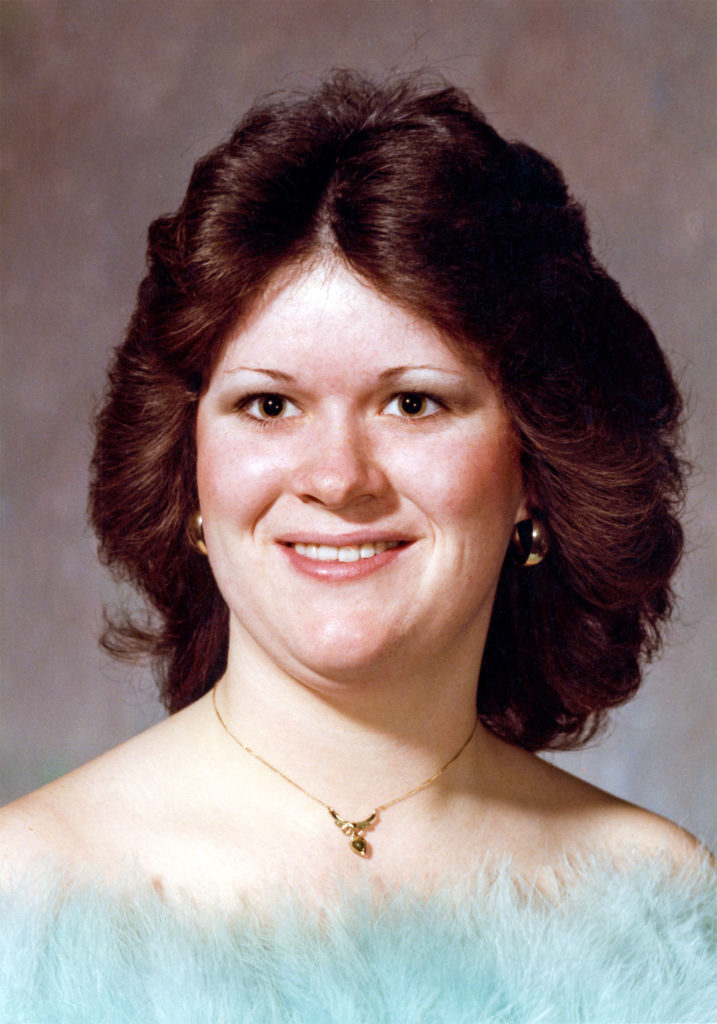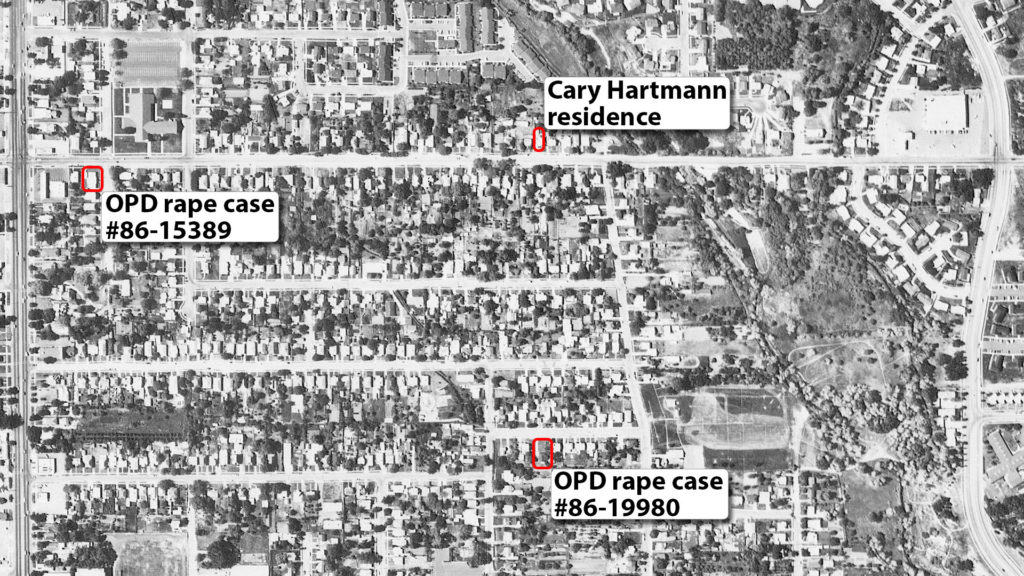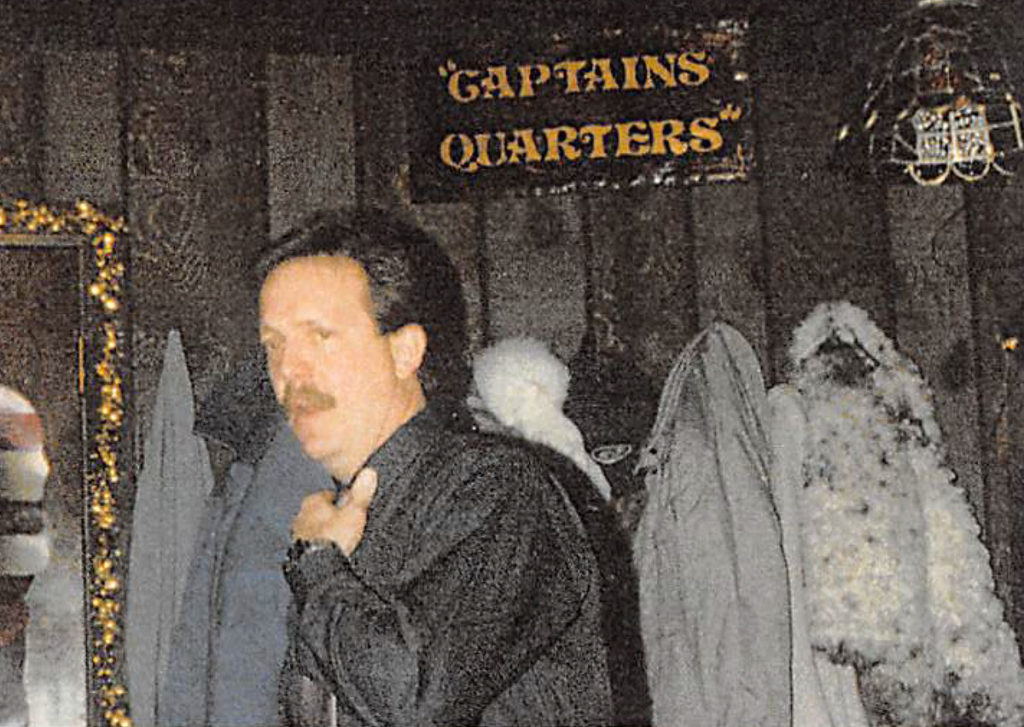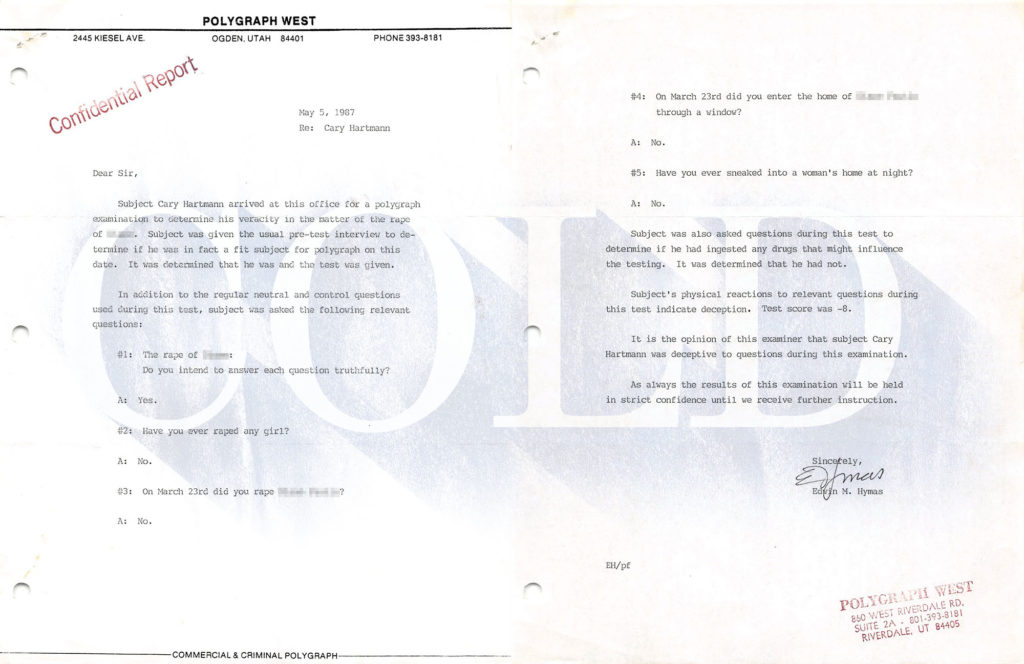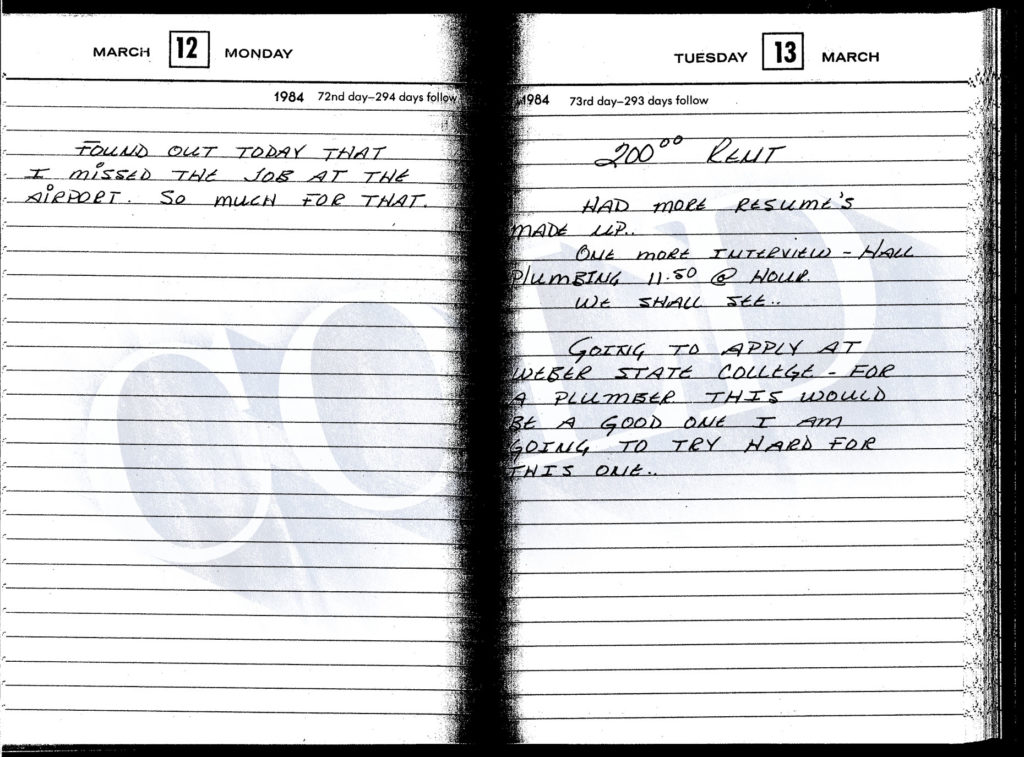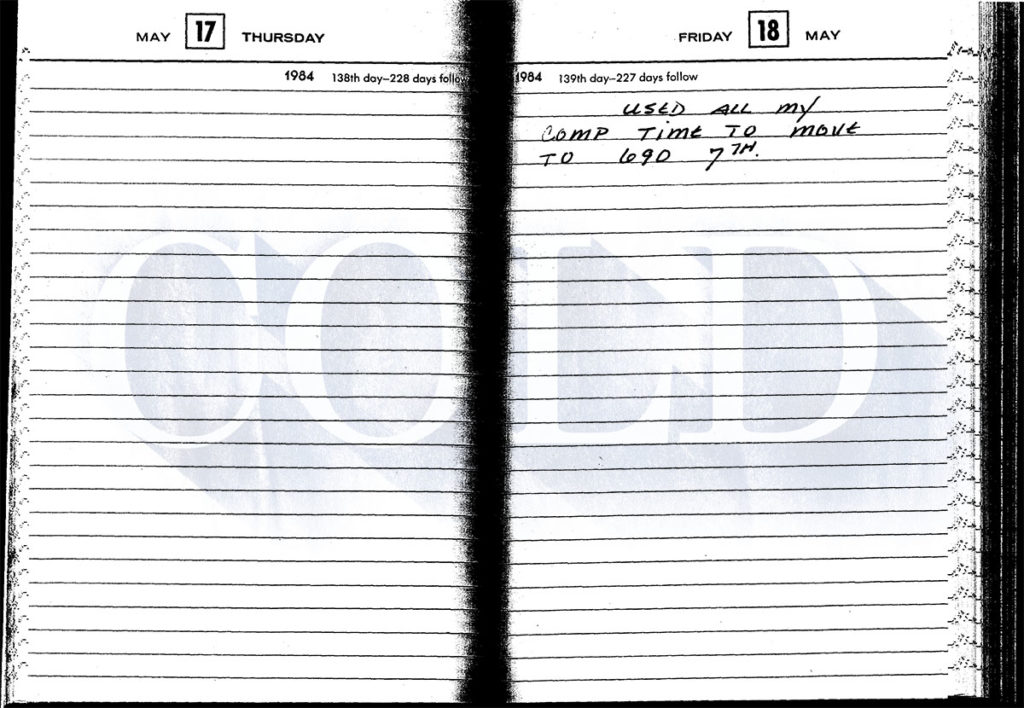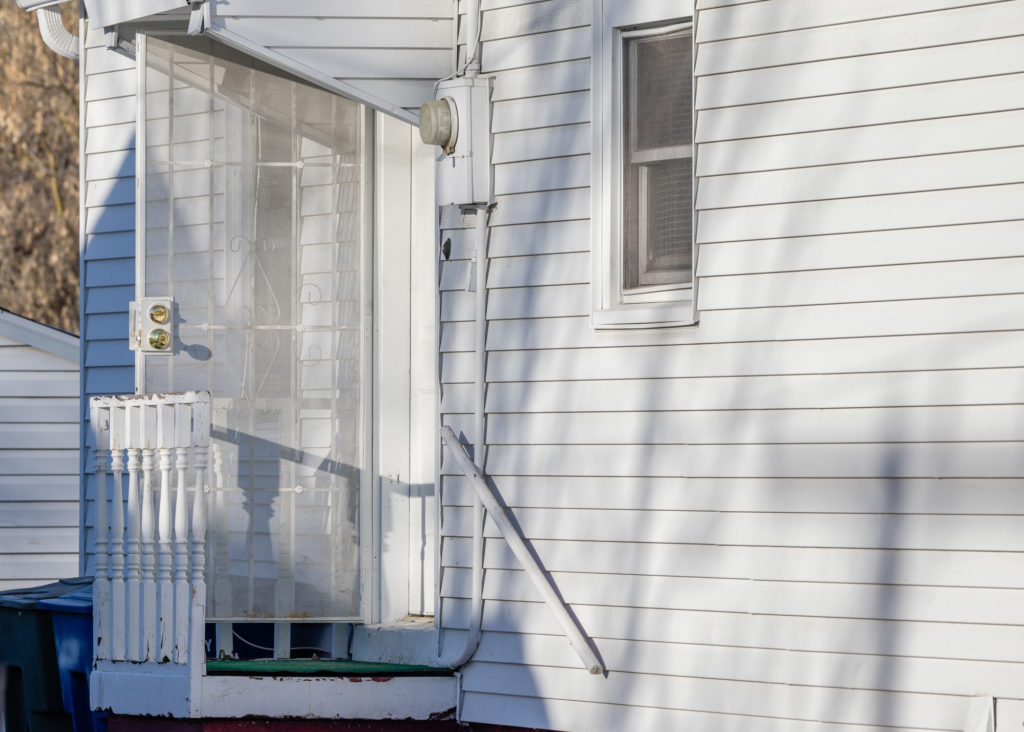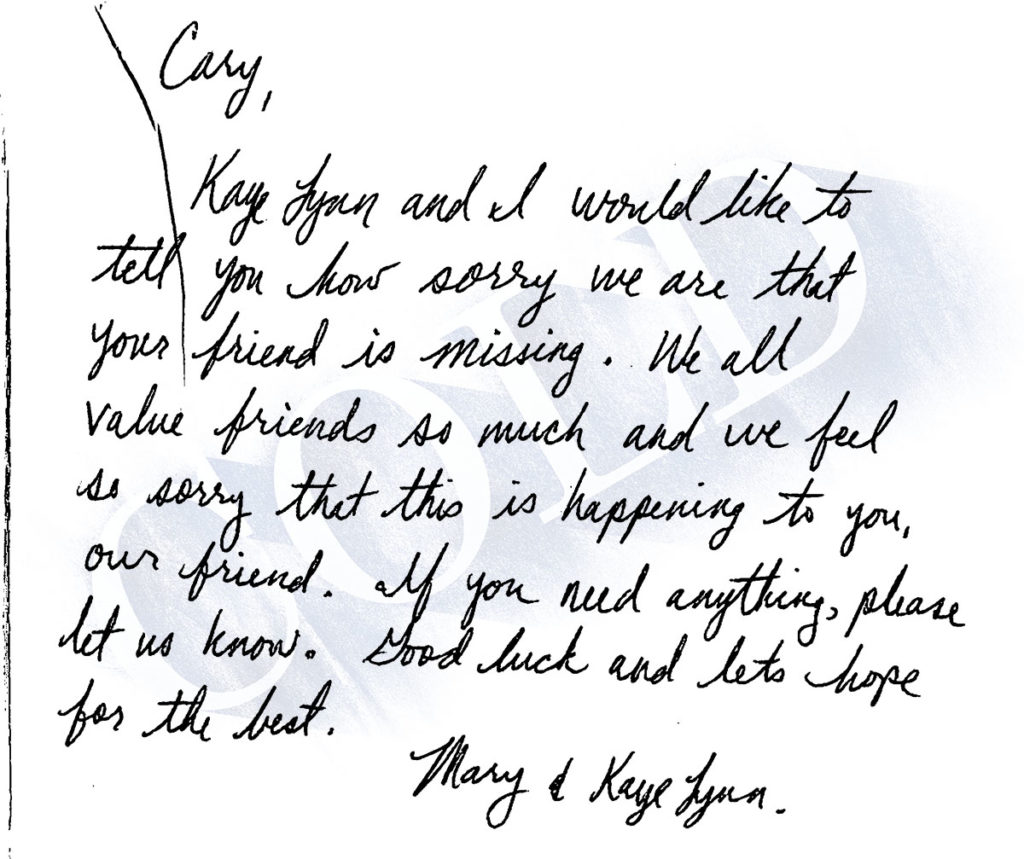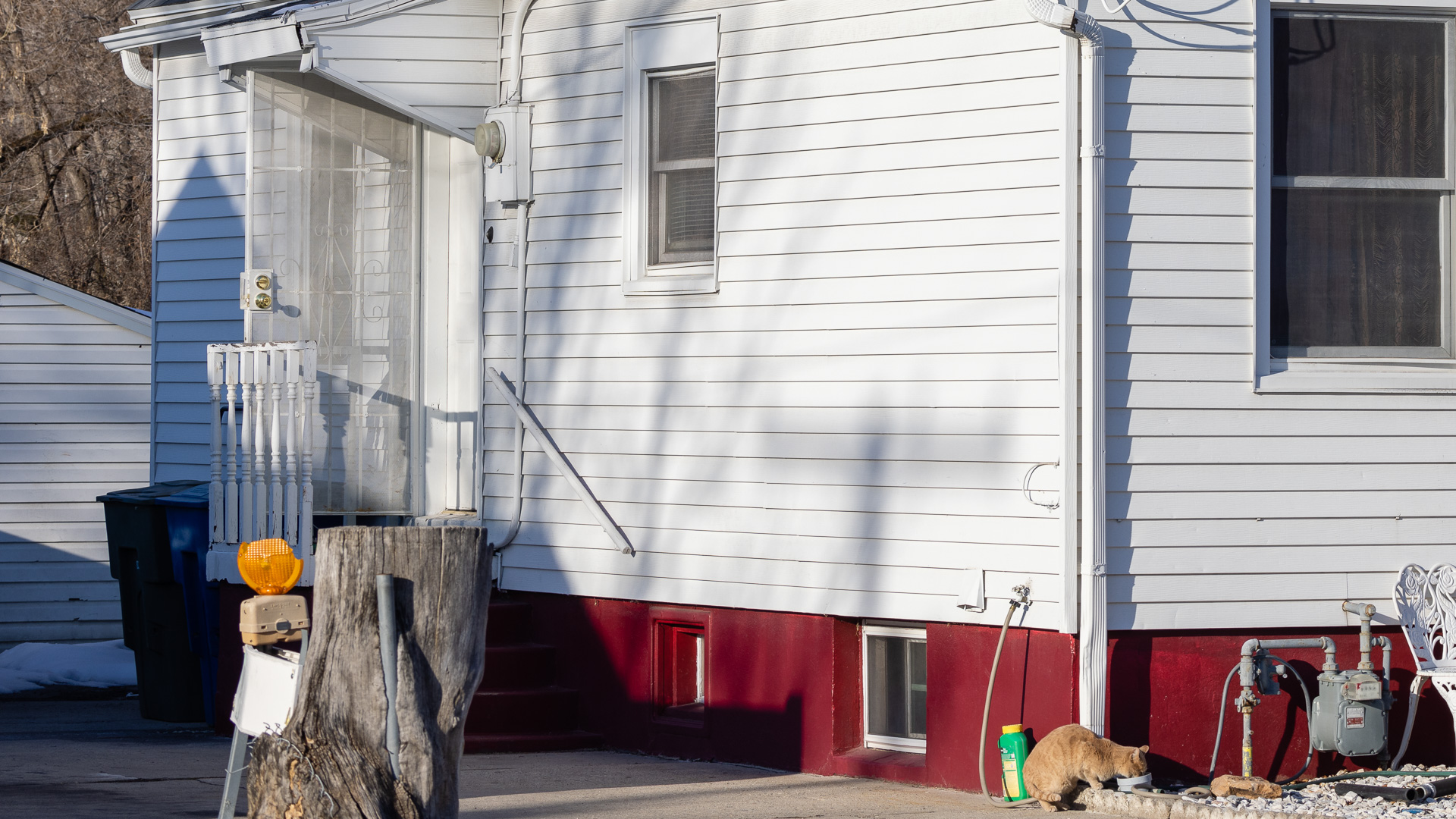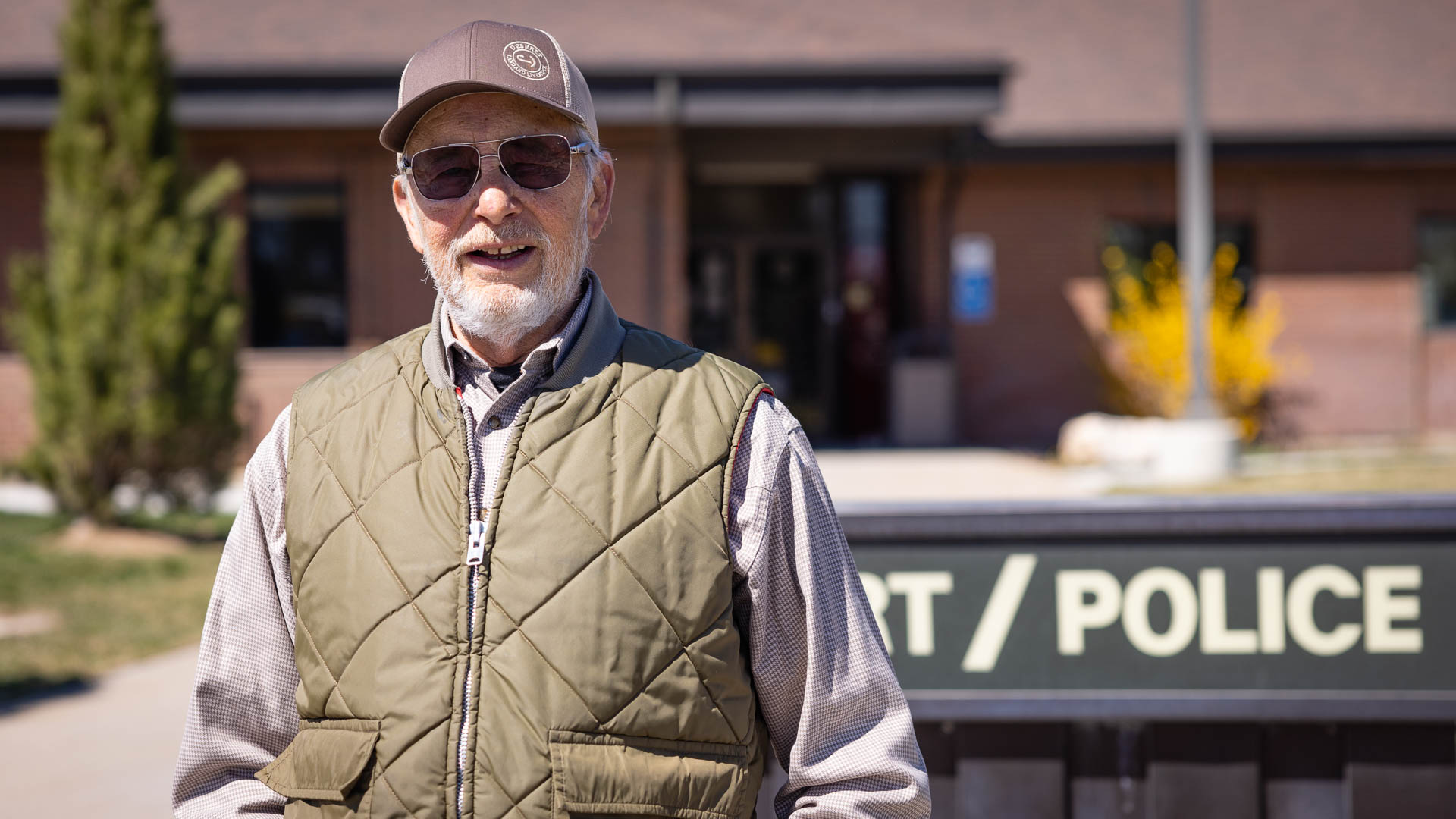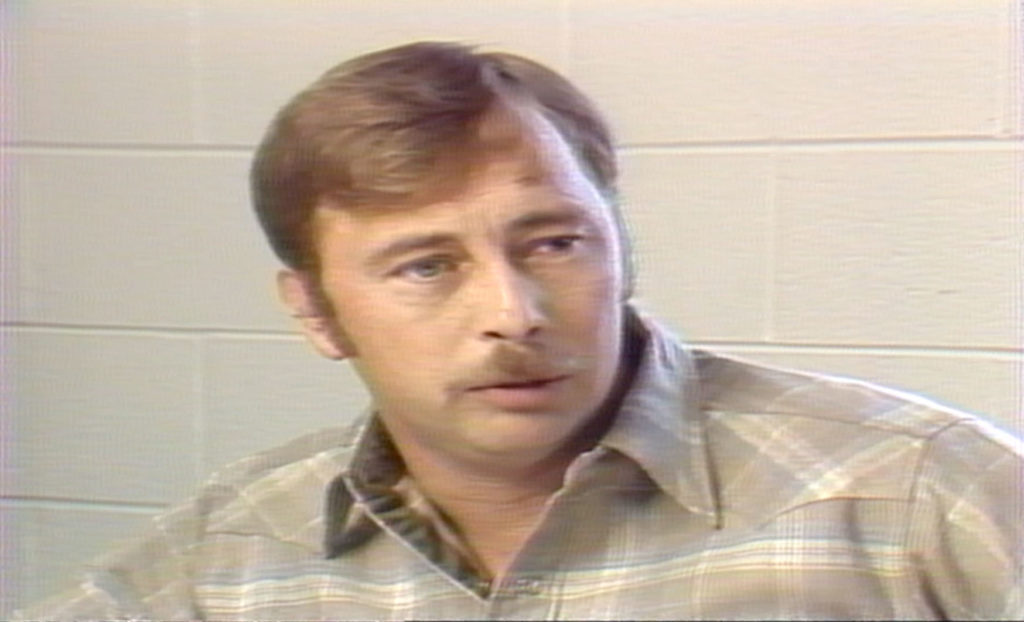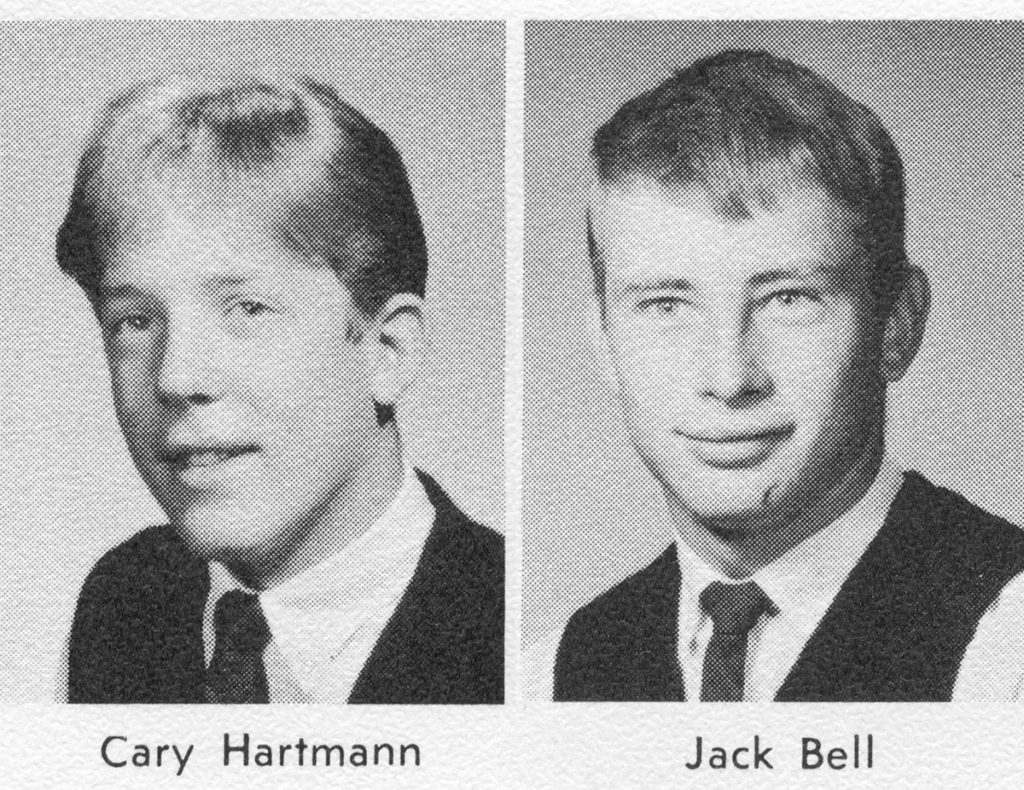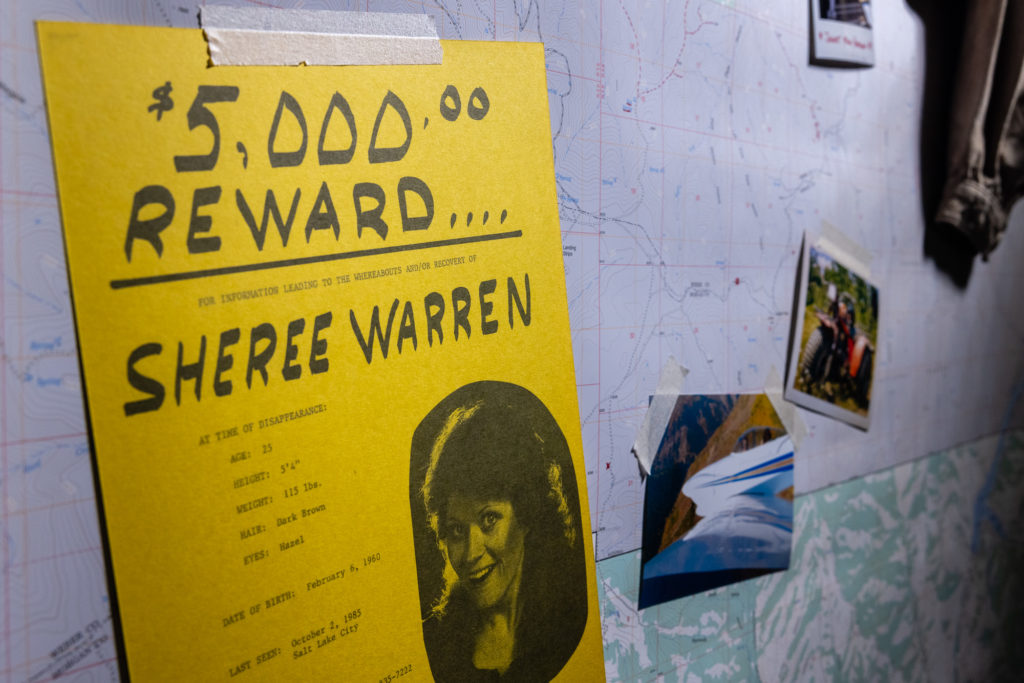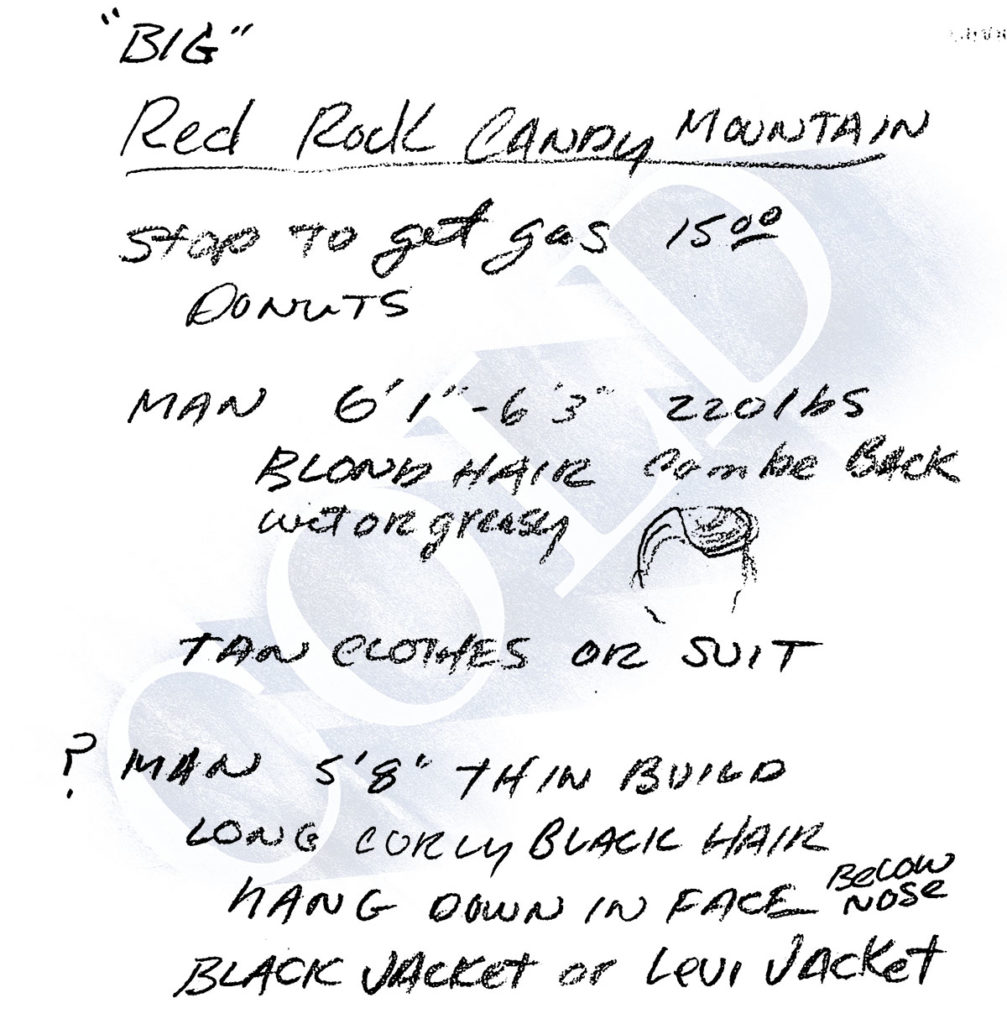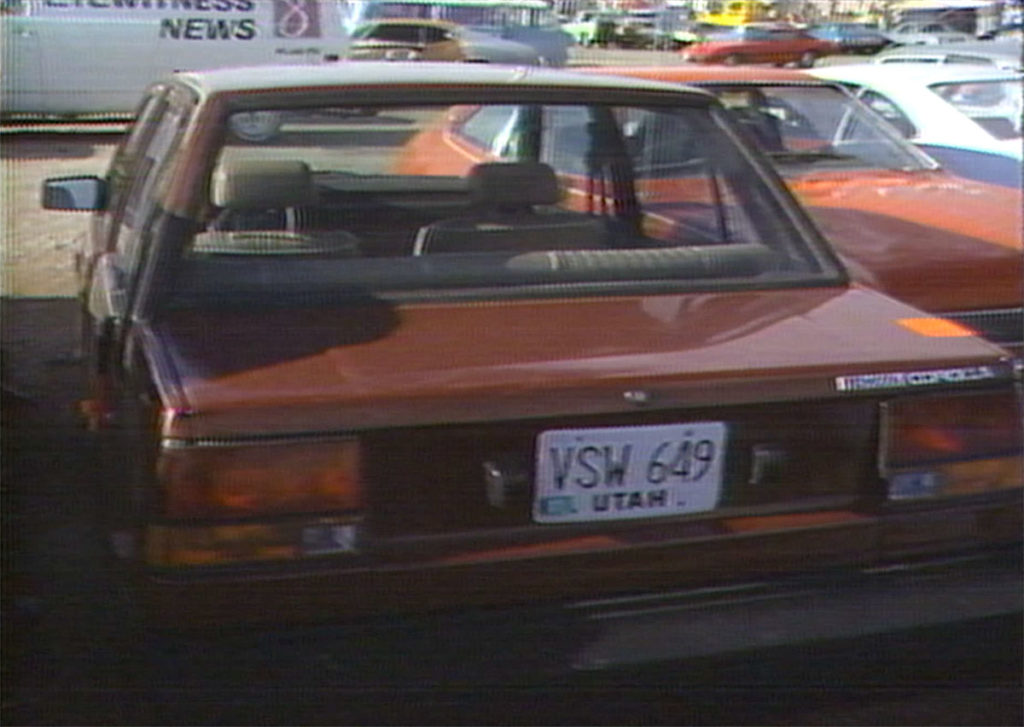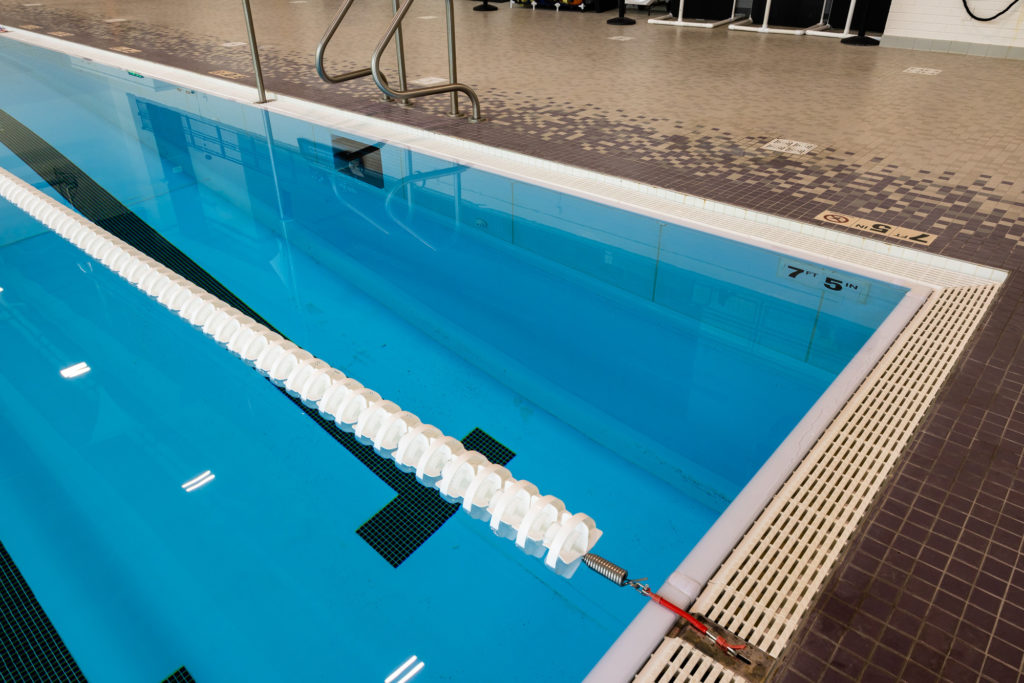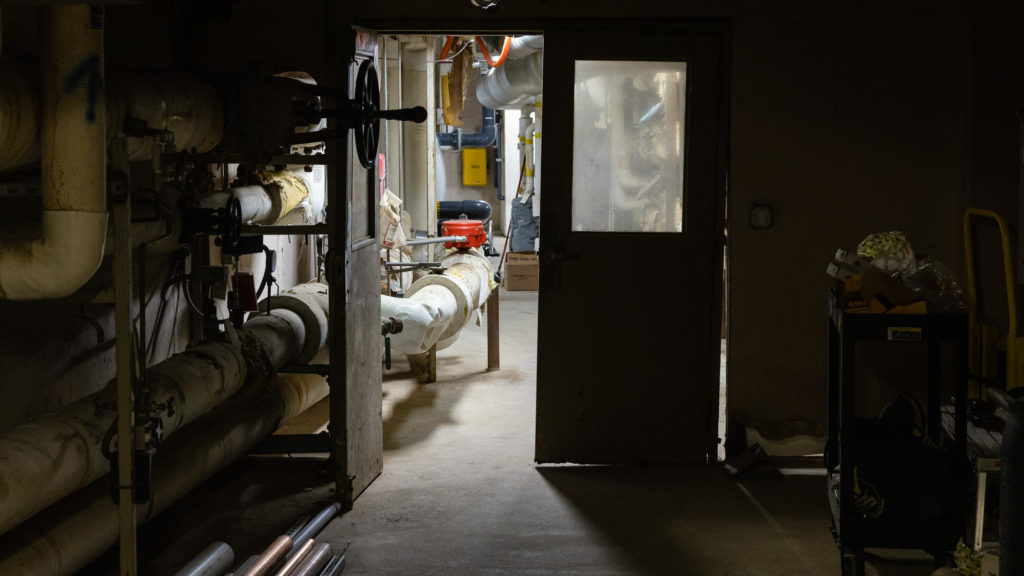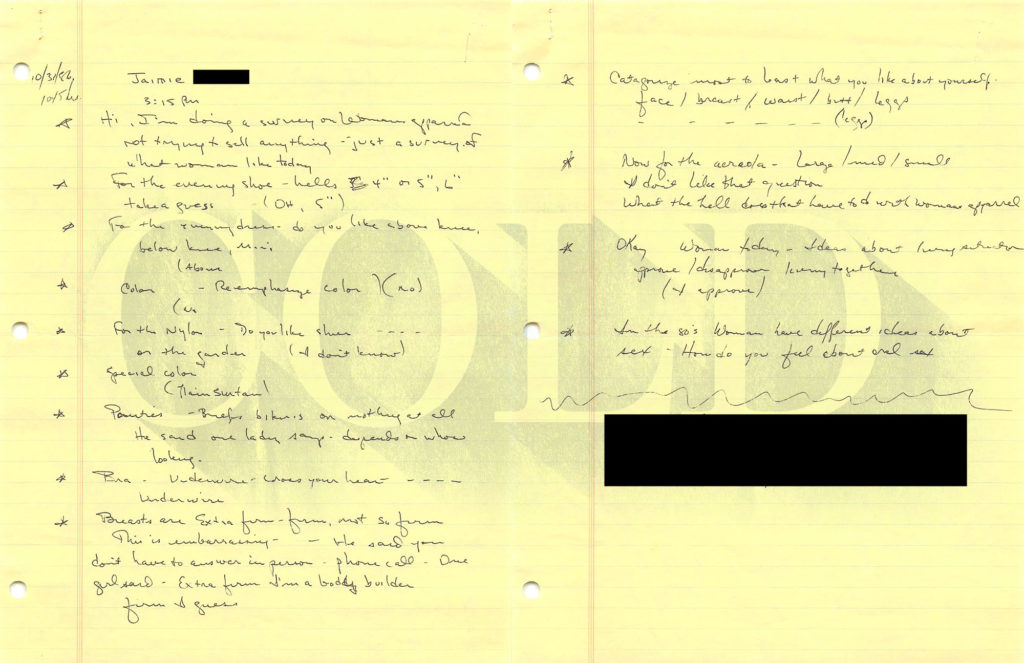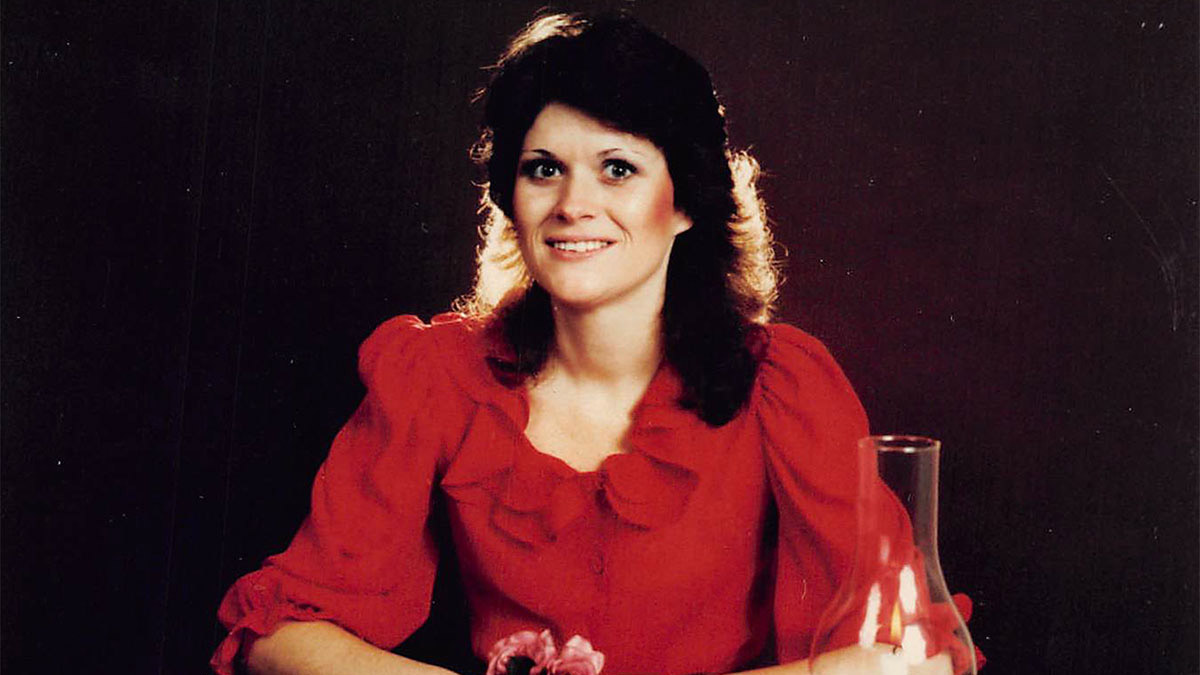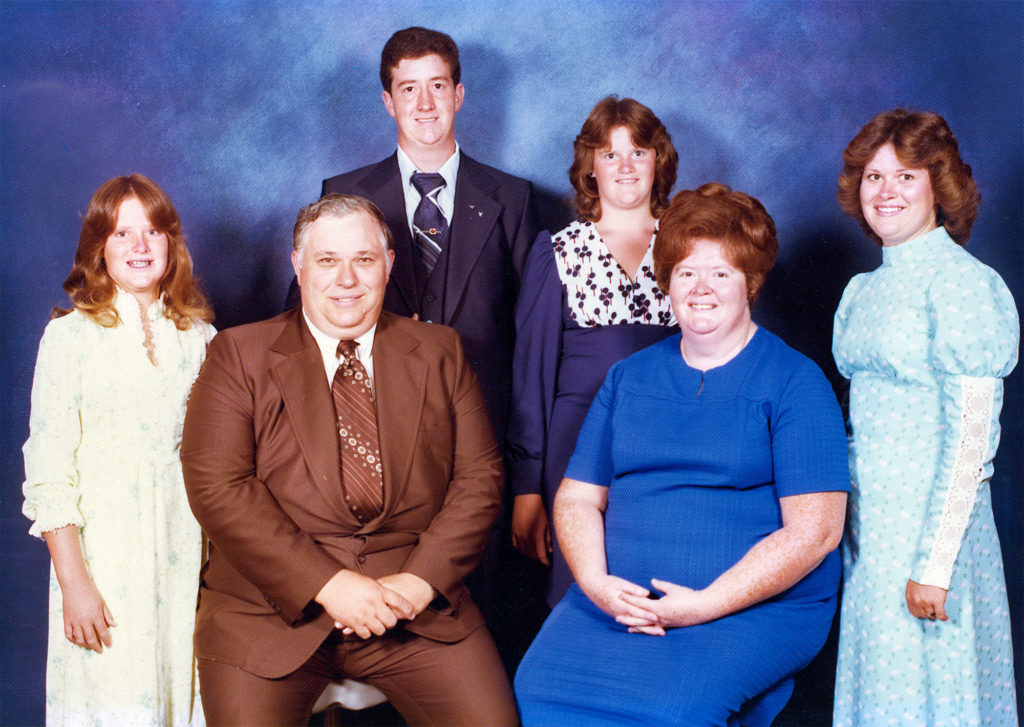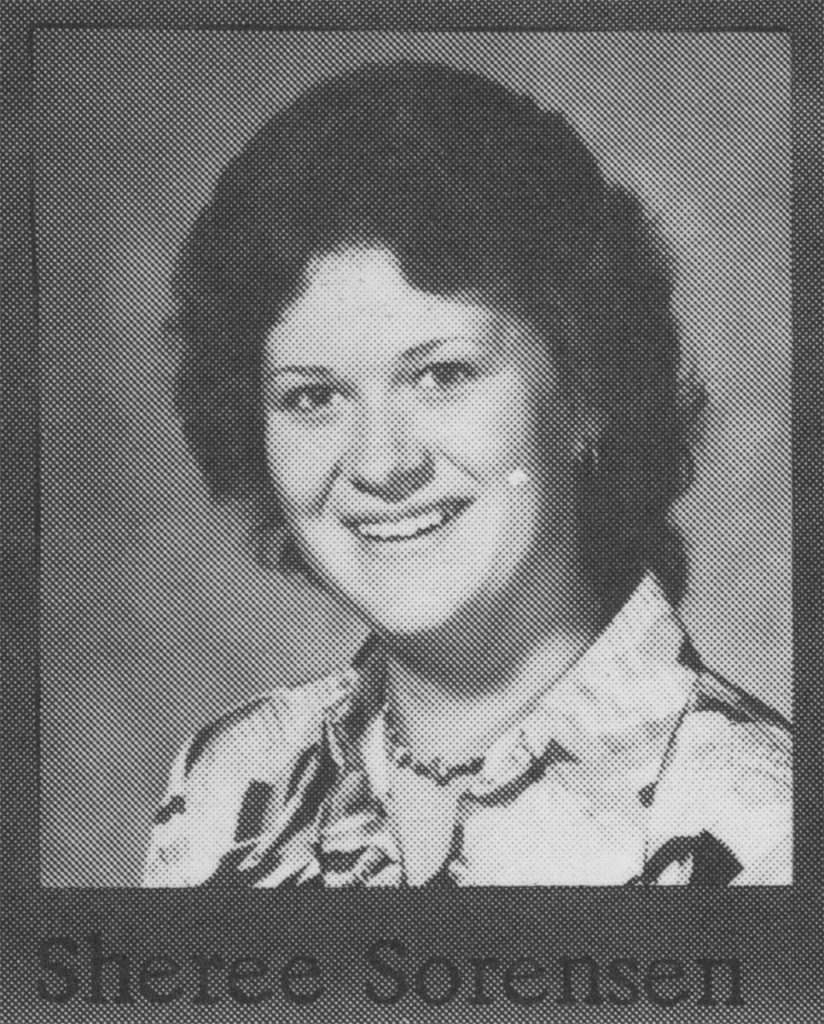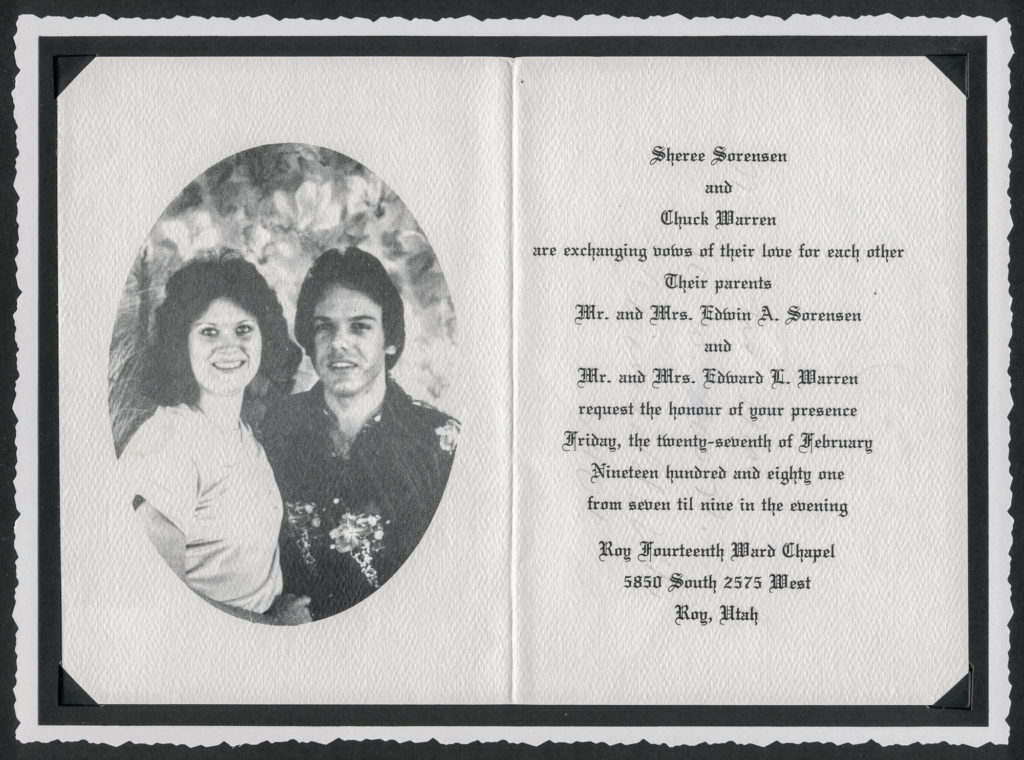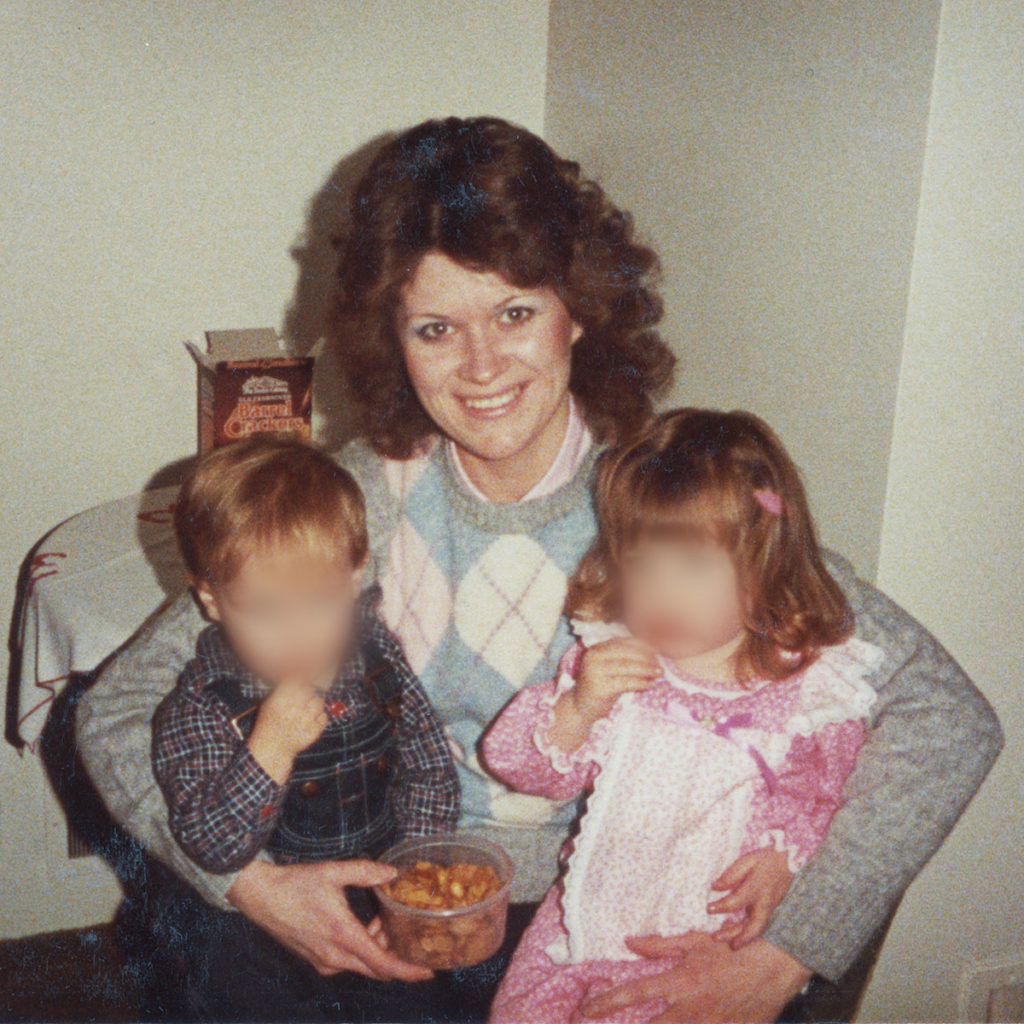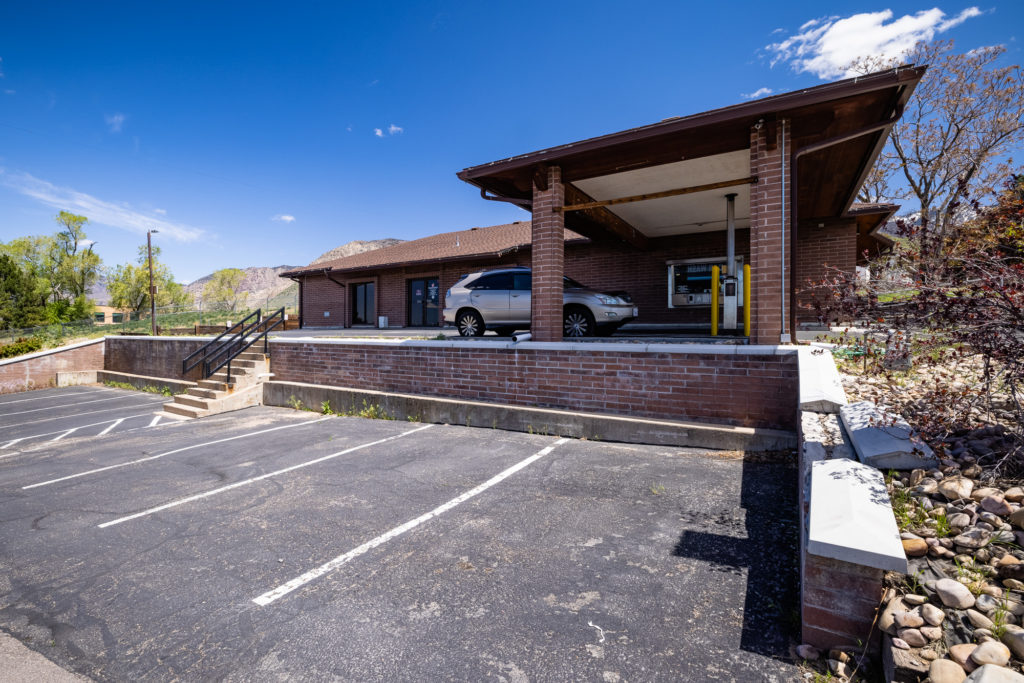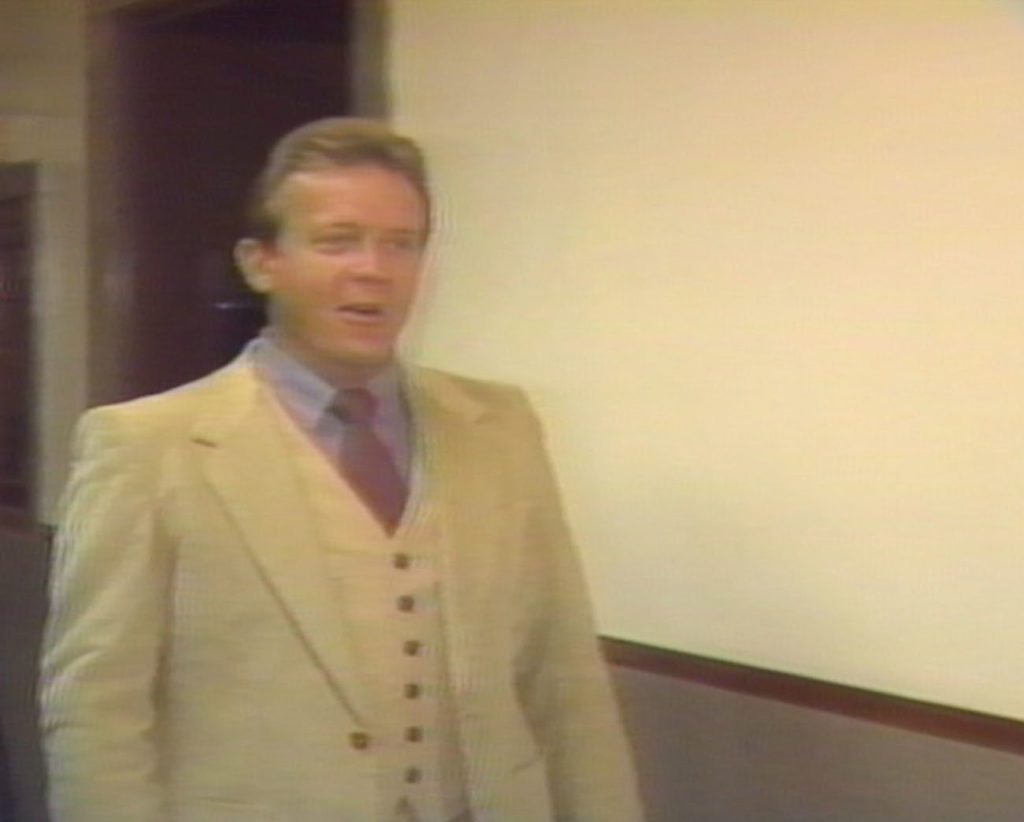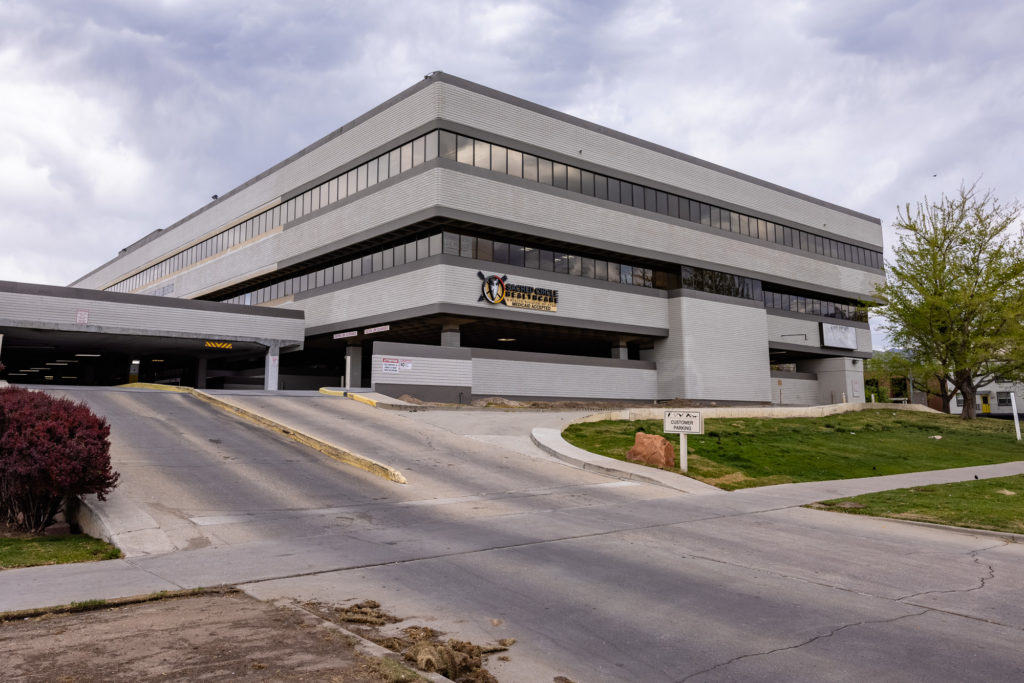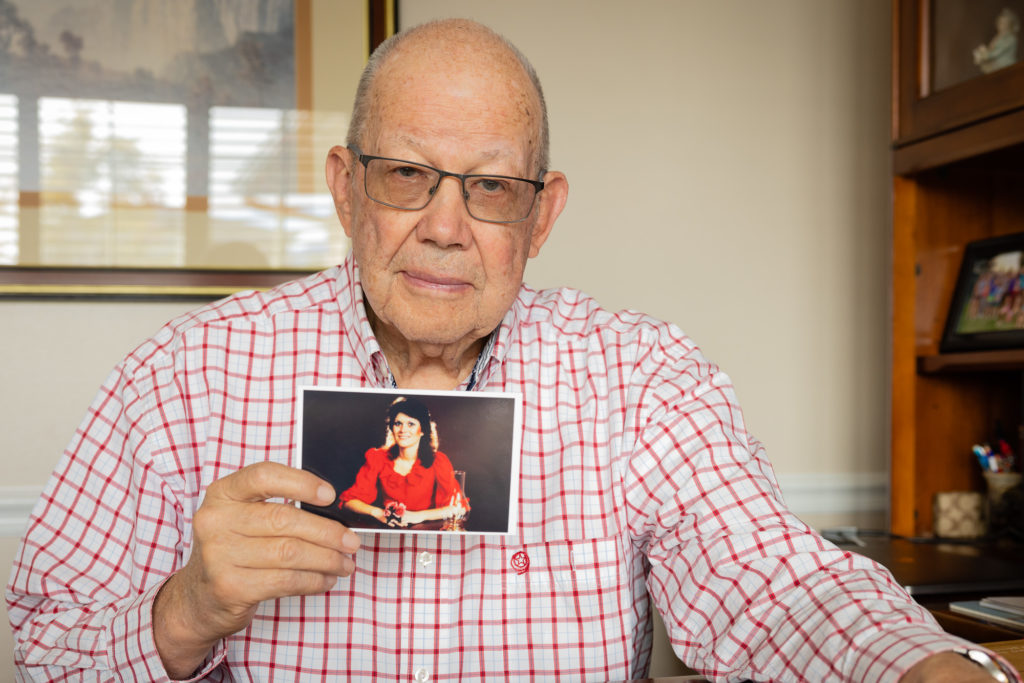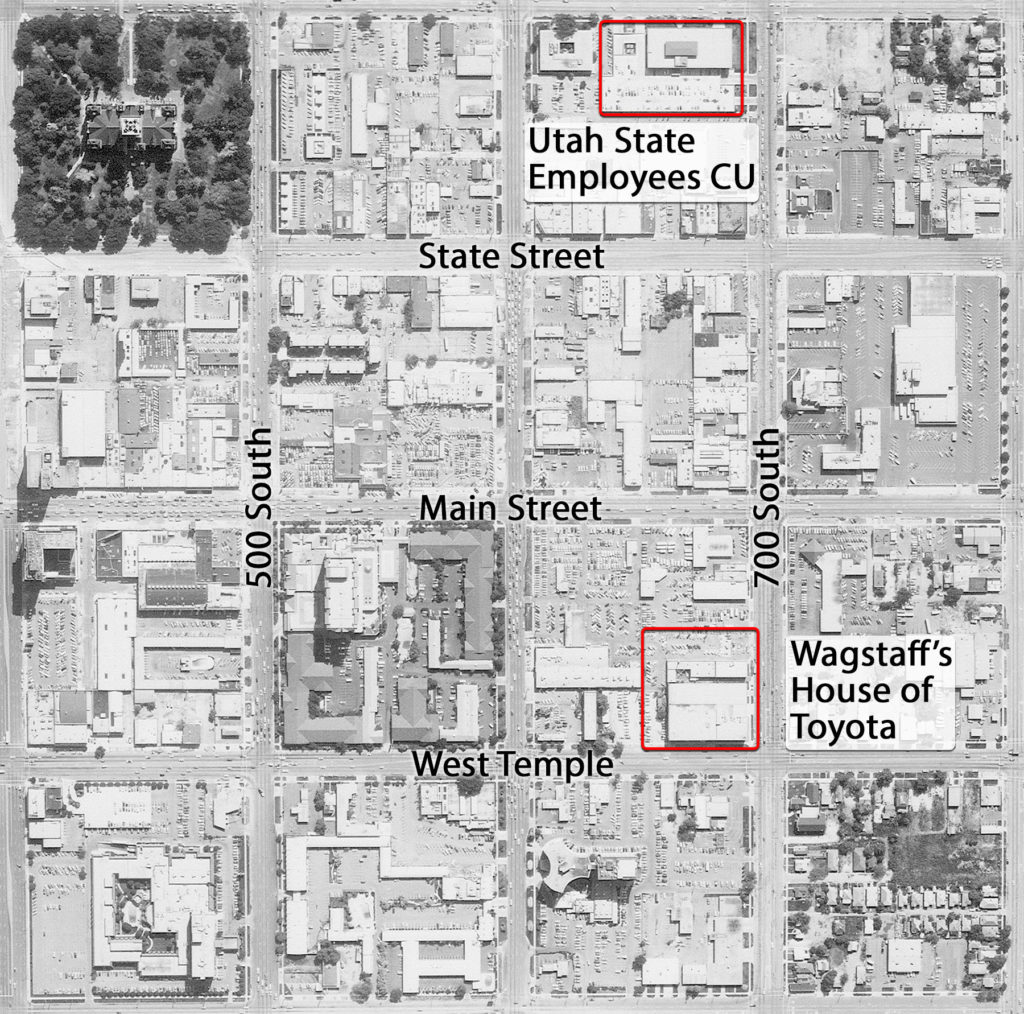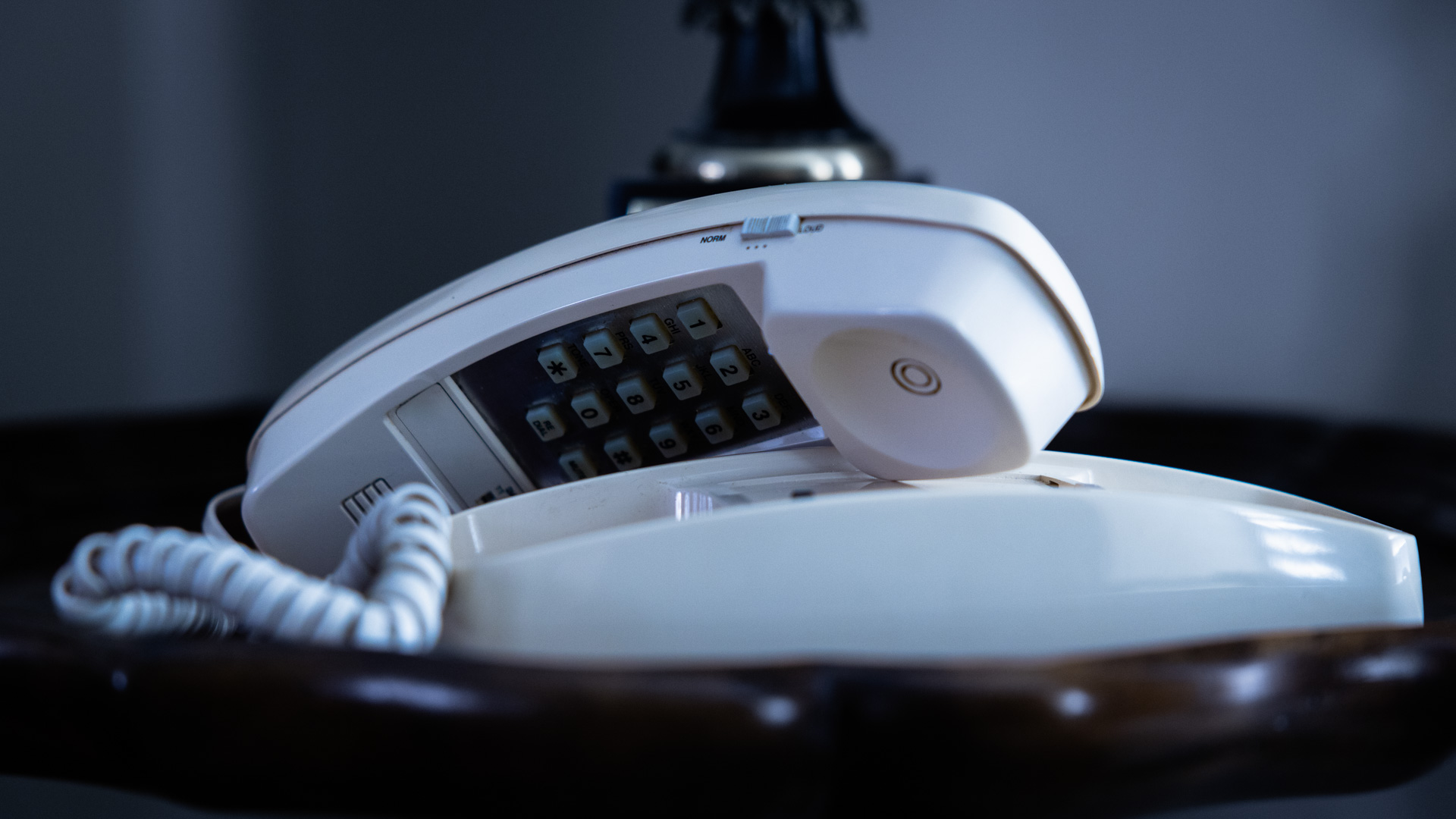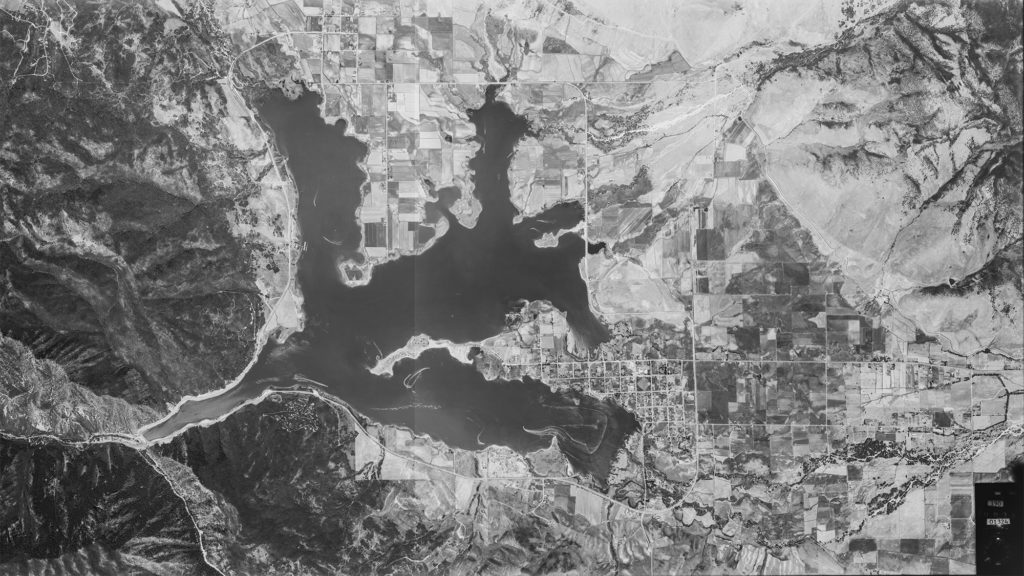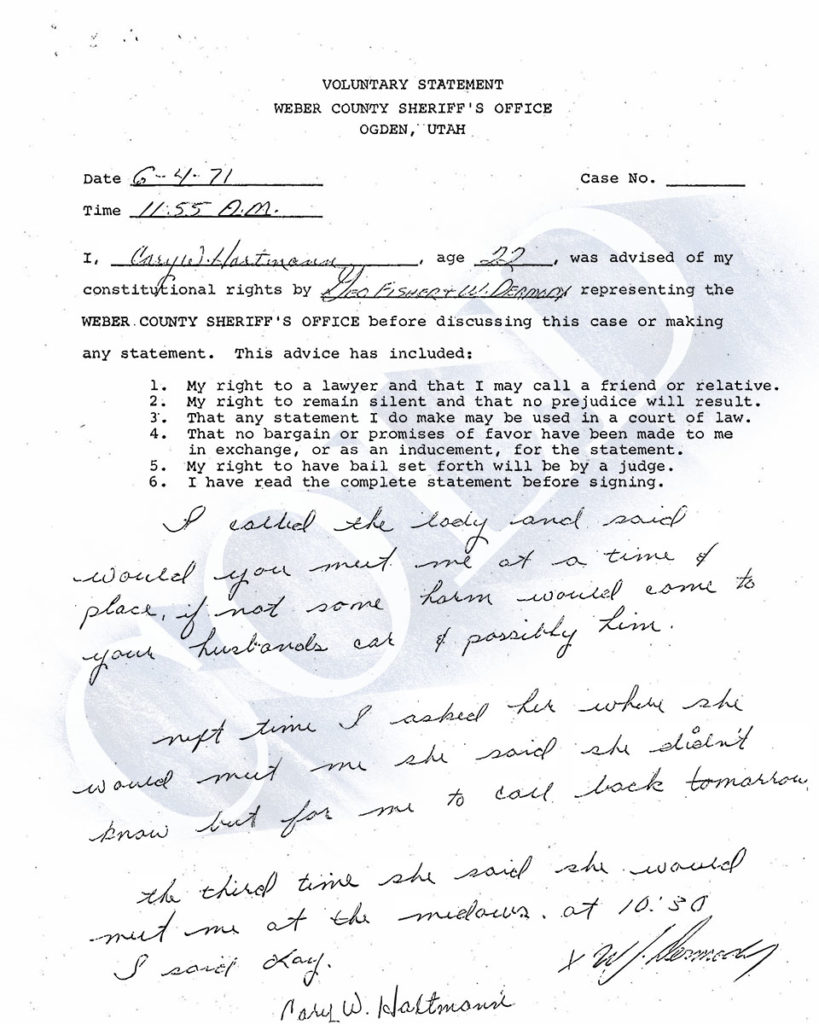Anonymous caller (from April 3, 1987 dispatch recording): I called about Crime Stoppers, the number?
Sheli Mann (from April 3, 1987 dispatch recording): About Crime Stoppers?
Dave Cawley: Weber County Sheriff’s dispatcher Sheli Mann took a call just after noon on April 3rd, 1987.
Sheli Mann: I remember getting a call from an anonymous caller.
Anonymous caller (from April 3, 1987 dispatch recording): I’m reporting a body that I found.
Sheli Mann (from April 3, 1987 dispatch recording): A body?
Anonymous caller (from April 3, 1987 dispatch recording): Yeah, a body that I, that I, that I just happened across way up, y’know it’s way out, y’know it’s not in the communities or anything. It’s way out in the hills.
Sheli Mann: He was pretty vague.
Sheli Mann (from April 3, 1987 dispatch recording): Is it in Weber County?
Anonymous caller (from April 3, 1987 dispatch recording): It’s over there by, uh, Causey Dam.
Sheli Mann: He couldn’t really describe it because it was in a remote area and you would have to have a special map to find it.
Sheli Mann (from April 3, 1987 dispatch recording): Can I get your name?
Anonymous caller (from April 3, 1987 dispatch recording): No. … I’m not interested in leading search parties or anything like that.
Sheli Mann (from April 3, 1987 dispatch recording): You won’t give me your name?
Anonymous caller (from April 3, 1987 dispatch recording): I, I’m just reporting it y’know so we could, no, of course not. I didn’t do, have anything to do with it, y’know?
Sheli Mann: He didn’t want to give me his name and number. So I asked him if he could just hold on for just a minute and I put him on hold and I was trying to find somebody but there was nobody in the building. By the time I got back to him, he’d hung up.
Dave Cawley: Sheli was 23, a couple of years into what would become a lifelong career as a dispatcher.
Sheli Mann: And I remember so many calls over the years that still stick with me. I feel like I have PTSD from a lot of calls.
Dave Cawley: This call wasn’t on that list. At least, not until Sheli heard it for the first time in more than 30 years in season 2 of this podcast.
Sheli Mann: It’s a little bit odd hearing my own voice after that many years. A little bit strange.
Dave Cawley: She hadn’t realized searchers never found the body.
Sheli Mann: And this one now will hang on to me forever. Wishing I could’ve done more.
Dave Cawley: The anonymous caller made two calls to police that day. The first went to Roy City police who were at that time investigating the disappearance of Sheree Warren. Maybe the anonymous caller knew Roy police were looking for Sheree. Maybe he lived in Roy. Or, maybe it was just coincidence. The man didn’t mention Sheree by name and the dispatcher, realizing the body was outside Roy City boundaries — not Roy police’s jurisdiction — told the man to instead call the Weber County Sheriff’s Office. That’s how he’d ended up talking to Sheli.
Sheli Mann: That was a long time ago.
Dave Cawley: Weber County mobilized its search and rescue team to look for the body in the days that followed, but they weren’t able to go far into the mountains around Causey because winter snow still covered the high country. Their search came up empty. In the last season of Cold, we explored how this anonymous phone call influenced the search for another missing Weber County woman: Joyce Yost. But in this episode, we’re going to hear why evidence I’ve since uncovered strongly suggests the body more likely belonged to Sheree Warren.
This is Cold, season 3, episode 4: The Supper Club. From KSL Podcasts, I’m Dave Cawley.
[Ad break]
Dave Cawley: One day after the anonymous caller reported finding a body in the mountains east of Ogden, an Ogden woman received an odd phone call of her own.
John Greene (as Cary Hartmann from April 4, 1987 police report): Hi! I’m calling to conduct a survey in an attempt to find some answers about the woman of the eighties: is she taller, shorter, thinner, heavier, etcetera.
Dave Cawley: This is a recreation, based on what the woman told police the caller said.
John Greene (as Cary Hartmann from April 4, 1987 police report): We feel it is important to ask her and get her feelings and opinions about the lifestyle she is living in the ‘80s.
Dave Cawley: The caller rattled off questions about family and fashion before turning to lingerie, anatomy and sexual preferences. Another woman received a similar call the next day, and another a week later. Ogden police detective Chris Zimmerman saw those calls going out from Cary Hartmann’s phone, thanks to the pen register he’d placed on Cary’s line. The pen register wasn’t a wiretap. It didn’t record the audio of those calls. But it did log every number dialed.
Zimmerman declined an interview for this podcast, but I’ve obtained his reports and personal notes from this case. Here’s what he wrote about it:
Kevin LaRue (as Chris Zimmerman from May 5, 1987 search warrant affidavit): Within a day of the numbers being recorded on the tape, I have called several of the numbers that were called. All ladies contacted state they did receive a magazine survey at the time listed on the tape, and all say the questions are the same wording dealing with female clothing, the female body and sex.
Dave Cawley: At the start of May, a woman named Teresa received one of the survey calls. She remained on the line through Cary’s questions, even the explicit ones. They agreed to meet for drinks at Sebastians, the same bar Cary had visited the night Sheree Warren disappeared. Zimmerman believed Cary had gone through the phone book, picking female names and calling them at random. He took his findings to Weber County Attorney Reed Richards.
Reed Richards: There were phone records that showed that he had made literally thousands of those types of calls, uh, which was pretty bizarre.
Dave Cawley: “Literally thousands” of lingerie survey phone calls. We’ll never know the total number, but police wrote in an average month during 1986, Cary’d made between 500 and 600 lingerie survey calls. Keep up that pace for a year you’d be looking at more than 6,000 phone calls.
Reed Richards: Talking to women about all sorts of goofy topics.
Dave Cawley: Goofy to Reed, terrifying to many of the women. One of those women spoke to detective Chris Zimmerman. She told him she’d recognized the survey caller’s voice. He was Cary Hartmann. They’d dated several years before and she’d heard him making lingerie survey calls back then. She’d been around Cary one time in ’86 and had fished in his coat pocket while he wasn’t looking. He’d carried a small black book full of names and phone numbers, along with notes about how various women had responded to the survey questions.
Reed Richards: It tends to indicate probably a guy that’s perverted. And that’s, I think, what he was.
Dave Cawley: Prosecutor Reed Richards was well aware of the rash of home invasion rapes that’d rocked Ogden City for more than two years. Detective Chris Zimmerman told Reed he could tie Cary Hartmann to at least a handful of those rapes.
Reed Richards: They were fairly unique. Uh, they all involved young women, usually 19 to 25. Uh, they were all women that were not with their husband, either separated or never been married. They all had young children. He would threaten to hurt or kill the child if the woman made any noise and he claimed to have access to police records and that if he, they went to the police he said he’d know and he’d come back and kill the child.”
The time had come to pull Cary in for questioning.
Reed Richards: So we had to strategize the best way to try to deal with that.
Dave Cawley: Cary still had friends within the ranks of the Ogden Police Department from his time in the reserves.
Reed Richards: We decided we’d find somebody that, that kind of knew him from his association with the police and that was a good interrogator and a fairly congenial guy and so we landed on, uh, Chris Zimmerman.
Dave Cawley: Ogden police detective Chris Zimmerman, the guy who’d issued a phony parking ticket to President Ronald Reagan. Zimmerman called Roy police detective Jack Bell, who was leading the investigation into Sheree Warren’s disappearance. Zimmerman briefed Jack on the new evidence that suggested Cary Hartmann had been making hundreds of lingerie survey phone calls.
Jack Bell: Exactly, and been going on for quite a while.
Dave Cawley: And Zimmerman believed Cary could be the Ogden City Rapist. Jack told Zimmerman he’d started to suspect Cary’d killed Sheree Warren.
Jack Bell: I was still looking at Chuck, but…
Dave Cawley: …but Jack hadn’t found any direct evidence linking Sheree’s estranged husband Chuck Warren to her disappearance. So Jack…
Jack Bell: …shifted gears from Chuck to Cary.
Dave Cawley: Detectives Jack Bell and Chris Zimmerman agreed to work together. They came up with a plan. Zimmerman would call Cary in to Ogden Police headquarters for an interview. While he was there, Jack and other detectives would serve a search warrant at Cary’s apartment. They would use the lingerie survey phone calls as grounds for the warrant. But while in the apartment, the detectives would keep an eye out for anything that might tie Cary to the rapes or the suspected murder of Sheree Warren.
In an odd twist, Cary called Ogden police himself the night before the detectives were to execute this plan. He phoned OPD to report his own case of telephone harassment. According to a police report, Cary said he’d received a rash of eerie phone calls. Cary was then dating a woman named Shauna. An anonymous source would later tell police Cary and Shauna had met through one of his lingerie survey calls. Shauna had started seeing Cary, despite still being married to a man named Roger Hall.
Court records show Shauna filed for divorce from Roger in January of ’87 and it’d not gone smoothly. Roger filed a half-million dollar civil lawsuit against Cary, accusing him of seducing Shauna into infidelity. The bad blood between Roger and Cary simmered for months. Cary believed Roger and his girlfriend’s brother-in-law — a guy named Melvin Feller — had both been calling his home phone and hanging up in an effort to annoy and intimidate him. He told an Ogden police officer he might just go take care of Roger himself, physically, if the police wouldn’t do anything. The officer urged Cary not to do anything rash.
Cary had gone to work the next morning and at noon stopped by a burger joint for lunch with two coworkers. Melvin Feller just happened to be there. Cary pulled out a pen and paper and started jotting notes, presumably to provide to police.
John Greene (as Cary Hartmann from May 5, 1987 personal notes): I was writing down his plate number when he said something smart-assed. I walked over to him and said “don’t mess with me.”
Dave Cawley: These are Cary’s notes, read by a voice actor.
John Greene (as Cary Hartmann from May 5, 1987 personal notes): He said “Shauna and you will never have anything.”
Dave Cawley: Cary had allegedly replied “see you dead.”
John Greene (as Cary Hartmann from May 5, 1987 personal notes): I walked away. He provoked me again by saying something crude. … He called me a pervert and adulterer.
Dave Cawley: Melvin told police he’d called Cary a child molester. He reportedly said Cary had responded “I don’t molest children, I only molest women.”
John Greene (as Cary Hartmann from May 5, 1987 personal notes): I again said “Melvin, leave me alone.”
Dave Cawley: Detectives’ notes say Melvin said Cary told him “you don’t know how easy it is to kill somebody.” Melvin left the restaurant. As he drove away, he shouted back “see ya, Cary Fartmann.”
John Greene (as Cary Hartmann from May 5, 1987 personal notes): The man is a nut. Very childlike.
Dave Cawley: Later that evening, Ogden police detective Chris Zimmerman dropped by Cary’s apartment. He asked Cary to come down to police headquarters to talk out the whole situation with Roger Hall and Melvin Feller, the two guys Cary believed had bombarded him with harassing telephone calls. But when Cary arrived at Ogden police headquarters, Zimmerman instead confronted him about the lingerie survey calls. Here’s what Zimmerman wrote in his report:
Kevin LaRue (as Chris Zimmerman from May 10, 1987 police report): He admitted to making these calls, stating it was a problem he had and it was a sexual problem and he had been making the calls for over seven years.
Dave Cawley: Zimmerman brought up one of the rapes. He told Cary about the woman, who I’m calling Danielle, who’d remembered meeting him at the sewing machine repair shop, who’d later recognized his voice while at the bar where he worked, the Galleon.
Kevin LaRue (as Chris Zimmerman from May 10, 1987 police report): I asked if he did do the sexual assault and he denied it. Hartmann stated he had no idea where he was at the time, but he had never raped anyone; he could not stand the word rape and he would never think of raping anyone.
Dave Cawley: Zimmerman asked if Cary would take a polygraph. He said he would. So the detective drove Cary to a nearby testing facility. A polygraph examiner hooked him up to the machine and asked if he’d ever raped anyone, if he’d entered Danielle’s home. Cary answered no. The examiner said Cary’s physical reactions indicated deception.
Kevin LaRue (as Chris Zimmerman from May 10, 1987 police report): I asked if he would like to take another test and he stated yes. Hartmann was allowed to leave and I advised him I would set up another test.
Dave Cawley: A short time later, Zimmerman received a phone call. Cary had arrived home to find his apartment trashed. While he’d been away, Jack Bell and a pair of Ogden detectives had served their search warrant. They’d taken Cary’s little black book, a day planner and a Playboy calendar. He was furious.
Kevin LaRue (as Chris Zimmerman from May 10, 1987 police report): I explained they had to search the entire house and they were careful but it causes messes sometimes. Hartmann stated, “I feel like I’ve just been raped,” and he hung up the phone.
Dave Cawley: Cary returned to Ogden police headquarters on the morning of Friday, May 8th for his second polygraph. Zimmerman had arranged to have an outside agency conduct the second test. He drove Cary to neighboring Davis County, where a sheriff’s deputy was standing by. They did three runs through. The results again showed deception, and much more strongly this time. That’s probably because the deputy tossed in a new question: had Cary had asked Danielle if she was 16 years old while having sex with her?
Kevin LaRue (as Chris Zimmerman from May 10, 1987 police report): This was something only the victim, the police department and the suspect would have access to. It was never released to the media.
Dave Cawley: Cary denied ever having asked anyone their age during sex. He said he didn’t know Danielle and had never had any sexual contact with her. In a report, the deputy said in his opinion, Cary was “being deceptive in his answers.” With the polygraph done, detective Zimmerman faced a crossroads. He didn’t have enough for an arrest, so he could cut Cary loose, or try to turn up the heat. But to do that, he’d help. Because Zimmerman and Cary knew one another from Cary’s time in the police reserve, it made sense for Zimmerman to play “good cop.” So he introduced Cary to “bad cop,” a detective Cary didn’t know named John Stubbs.
Jack Bell: (Laughs) Uh, John Stubbs. A good detective. No two ways about it.
Dave Cawley: Jack Bell told me Stubbs was an old-school cop: abrasive and intimidating. Stubbs died in 2017, so I wasn’t able to interview him.
Jack Bell: Guy could read, read people really well.
Dave Cawley: Stubbs grilled Cary for four hours. I wish I could play you audio of that, but it doesn’t exist. Ogden police just didn’t record their interviews back in the ‘80s. The best we’ve got is a report detective Stubbs wrote a couple weeks later. It says Stubbs asked Cary why he’d failed the polygraph. Cary reportedly said he didn’t know. Stubbs said “you failed because you lied during the test.” Stubbs wrote: “Hartmann, losing his temper now, said ‘ok, it made me remember some things about…’ At this point his eyes got rather large and he seemed to suddenly realize what he was saying and stopped himself mid-sentence. I said ‘it made you remember some things that you don’t really want to remember, didn’t it?’ Hartmann would not respond to that at all.”
Chris Zimmerman observed the interrogation through a pane of mirrored glass.
Kevin LaRue (as Chris Zimmerman from May 10, 1987 police report): Hartmann stated he didn’t have to rape girls. He stated that he has gone to houses and girls will let him in and then he would talk them into sex but he never had to force anyone.
Dave Cawley: It wasn’t quite an admission. Zimmerman wasn’t sure what to do. Once Stubbs had finished, Zimmerman took Cary to his car and started driving back toward Ogden police headquarters.
Kevin LaRue (as Chris Zimmerman from May 10, 1987 police report): About two minutes after I started driving, Hartmann said to me that he wanted me to know he didn’t rape anyone. I asked why he was remembering the part about the 16-year-old and he stated he wasn’t sure, he was trying to answer, and he wanted to tell me. At this time it appeared Hartmann wanted to confess, but couldn’t do it. I advised Hartmann that I felt he couldn’t confess because in his mind, Cary Hartmann didn’t do it, that another personality in Hartmann was making him do this. I then asked if that was possible and he said yes.
Dave Cawley: It seems a little strange for Zimmerman to’ve suggested this split personality idea out of the blue, but remember, he was playing good cop. By suggesting another personality had done the deed, Zimmerman was giving Cary an opportunity to say what’d happened without taking responsibility. They hadn’t quite made it back to Ogden police headquarters when Zimmerman suggested they drive by Danielle’s house, to see if it might jog Cary’s memory.
Kevin LaRue (as Chris Zimmerman from May 10, 1987 police report): I stopped at the stop sign at 2450 Custer, Hartmann stated “this is it, this is real familiar.” … He said “this is scary, Chris!”
Dave Cawley: They pulled up to the curb.
Kevin LaRue (as Chris Zimmerman from May 10, 1987 police report): I asked him to tell me how he got in and he said it was a window. … He stated he pulled off a screen and the window was unlocked so he went in. He stated he went in and laid on the bed beside the girl.
Dave Cawley: I won’t repeat the specific details of the assault, but Zimmerman wrote everything Cary said was “fairly accurate” compared to what Danielle had described.
Kevin LaRue (as Chris Zimmerman from May 10, 1987 police report): Hartmann stated that he really felt the girl enjoyed this so he didn’t feel he was forcing it. When I advised him that [she] probably didn’t fight because she was so scared, he said “oh great,” as if he was sad and disappointed.”
Dave Cawley: Cary reportedly admitted he’d first seen Danielle at his friend Dave Moore’s sewing machine repair shop.
Kevin LaRue (as Chris Zimmerman from May 10, 1987 police report): I asked how he got her address and he stated he was good with numbers and he remembered everything.
Dave Cawley: They went to OPD headquarters. Zimmerman sat Cary down and they went through it again.
Kevin LaRue (as Chris Zimmerman from May 10, 1987 police report): I then advised Cary that there were several other sexual assaults in the area around his house on 7th Street … and I felt he did them. Cary immediately asked if he had hurt anyone. … He stated he couldn’t remember details, he wanted to but couldn’t.
Dave Cawley: Cary reportedly said he sometimes woke up exhausted in the morning, because he’d go out walking or driving at three or four a.m. Zimmerman knew many of the rapes had occurred around 4 a.m.
Kevin LaRue (as Chris Zimmerman from May 10, 1987 police report): I asked how many times he had woke up in the morning and knew he had done something wrong to another girl … and he stated “a half dozen times or more, Chris.”
Dave Cawley: Zimmerman wrote “I questioned him on threatening the children, he wouldn’t deny it, he just stated he would never hurt a child, that he loves his children.”
Kevin LaRue (as Chris Zimmerman from May 10, 1987 police report): He stated he was always nice and gentle and he used to have a problem with beating his first wives but he was over that.
Dave Cawley: Zimmerman decided to take Cary out for another drive. He cruised by several of the victims’ homes. I don’t have time to go through them all, but will highlight this one:
Kevin LaRue (as Chris Zimmerman from May 10, 1987 police report): I asked if he remembered any other girls and he said there was a pretty blonde he always saw at Kwik Mart. … I pointed to Kar Kwik at 7th and Washington and asked if that is where he saw the blonde. He said yes and stated she lived right up the street.
Dave Cawley: This woman, who I’m calling Caroline, lived near Cary’s old apartment on Ogden’s 7th Street. Zimmerman pulled the car around the block from the convenience store.
Kevin LaRue (as Chris Zimmerman from May 10, 1987 police report): As I turned, he pointed to the red brick duplex on the corner and told me she lived there. He then pointed to the correct door of the duplex when I asked which door. … He then stated “the curtains were open and I could see her.”
Dave Cawley: Zimmerman remembered having seen footprints in a flower bed in front of that same window the morning after the rape.
Kevin LaRue (as Chris Zimmerman from May 10, 1987 police report): We felt at the time the suspect had looked through the window. … He said he went in through the front door because it was unlocked and he turned off the TV because of the light. He stated he kneeled beside the couch and started to kiss her and it frightened her so he told her “I didn’t mean to scare you.”
Dave Cawley: Again, I won’t repeat the details of the sexual assault itself. It’s only important to know Cary’s description mostly aligned with what Caroline had told police. She thought her attacker had come through the back door, not the front.
Kevin LaRue (as Chris Zimmerman from May 10, 1987 police report): Hartmann stated that the girl really didn’t resist, that she really liked it.
Dave Cawley: They returned to OPD headquarters around 5:30 p.m. Zimmerman left Cary with his boss, Captain Marlin Balls, for a few minutes. Balls wrote in a report, Cary seemed concerned his friends would think he was a “real sleaze ball.” He acted grateful Zimmerman hadn’t treated him like a “dirt bag.” Cary’s friends included a lot of guys within the OPD ranks. He was actually planning on joining Balls, Zimmerman and others on a hunting trip to Idaho in a matter of days. Balls assured him it would just be a matter of time before this was all over.
Zimmerman returned and told Cary they were taking one more drive. This time, it was to the Weber County Jail. He booked Cary on suspicion of two counts each of aggravated sexual assault and burglary, for the attacks on Danielle and Caroline. The following morning, a judge set Cary’s bail at $30,000. Cary’s girlfriend, Shauna Hall, and his parents got a bail bondsman to put up the cash. He was out of jail in less than 24 hours.
Cary arrived home at his apartment Saturday evening to find a message on his machine. It was from Teresa, the woman he’d placed a lingerie survey call to a week earlier and then met for drinks. Teresa would later tell a detective she went to Cary’s apartment around 10:30 that night and found him “depressed.” He didn’t mention having been arrested, saying only “everything finally came to a head.”
Ogden police detective Shane Minor, one of the investigators on the Ogden City Rapist case, hosted a briefing for detectives of the Salt Lake City Police Department’s missing and murdered women task force on the morning of Monday, May 11th, 1987. Shane and his colleagues had kept their information about Cary Hartmann off the books for months.
Shane Minor: That information we were working off of was kept pretty close. There was two or three of us that knew about it.
Dave Cawley: Now, Shane opened up. He gave the Salt Lake detectives each a sheet with Cary’s mugshot and a description of his truck, that not-so-pretty yellow Chevy pickup. The sheet said Cary owned a .357 magnum revolver and was known to walk the streets at night. It said he should be considered “unstable” and “unpredictable.”
Salt Lake police had three unsolved murders of young women they’d tied by ballistics to a single gun: a .38. A .357 can fire .38 rounds. But the Salt Lake detectives didn’t believe Cary was their serial killer.
Shane Minor: They just kind of discounted it because it was a little different than the other cases they were actively working.
Dave Cawley: Still, Shane asked the Salt Lake detectives to keep their eyes open. He told them the victims in the Ogden City Rapist cases feared Cary might try to find them.
Reed Richards: They didn’t want him coming after ‘em. So they, they all moved. Some of ‘em moved as soon as they came to police. But a whole lot more of ‘em moved once he was picked up and charged.
Dave Cawley: Weber County Attorney Reed Richards filed a series of formal charges against Cary that week, in connection with four of the rape cases. Cary remained a suspect in many more, but Reed focused on only those with the strongest evidence, with victims who seemed willing to endure the awful task of testifying.
Reed Richards: Y’know, there’s no two ways to look at it. If you have to go through a preliminary hearing that is open to the public and openly reported on — these aren’t kids and so they can report names and what they say, the whole works — uh, and then you’ve got to wait a few months, many months probably and then go through the trial and do the same thing, that’s why the last numbers I saw were maybe 70 percent of women don’t even want to report.
Dave Cawley: The most recent numbers from the U.S. Bureau of Justice Statistics are from 2020. They say 77 percent of rape or sexual assault victims don’t report the crimes to police.
Reed Richards: Because they don’t want to go through that. And of those that do report, a lot of ‘em back out midway through the process because they think “gee, this is just not worth it.”
Dave Cawley: The charges included aggravated sexual assault, a crime more serious than rape under Utah law because it included the use of force or threat of harm. Reed wanted Cary off the streets. Adding two new cases allowed him to secure an arrest warrant. Ogden police went and found Cary on Tuesday, May 12th and tossed him back in jail. The additional charges also significantly upped Cary’s bail, to $105,000.
Reed Richards: Which in—whatever it was—’87 or ’88 was a ton of money. It still is.
Dave Cawley: Reed feared if Cary managed to get out again ahead of trial, it might spook the women he’d attacked into recanting. At the time, Utah didn’t have a law that would’ve allow Cary to be held without bail. Reed hoped 100 grand would be enough. The criminal charges caught the attention of reporters.
Shane Minor: It made a big splash in the news media and especially in the Ogden Standard.
Dave Cawley: The newspaper published a story about Cary’s arrest that week.
Shane Minor: Then we received a lot of, lot of different calls referring to him.
Dave Cawley: Detective Shane Minor heard from women who described having had contact with Cary in the past.
Shane Minor: And what they would describe would be a date-rape type of situation. Or where they had gone out with him for a period of time, had stopped and then he would show back up and take advantage of them.
Dave Cawley: Shane talked to Jan, the divorcée who’d loaned Cary money for his truck back in the fall of ’84. I described Jan’s brief relationship with Cary in episode 1. She told Shane the story of how Cary’d dragged her into a closet on the Weber State College campus after she’d broken up with him.
Shane Minor: Just how he treated them was, was horrible.
Dave Cawley: Shane’s notes say Jan told him she’d not reported being raped back then, because she’d feared no one would believe her.
Shane Minor: They had gone out with him and he could take advantage of ‘em and didn’t worry about any repercussions because they had been dating and so who’s going to believe them and at the same time he’s basically abusing them.
Dave Cawley: Some of the women described this kind of activity taking place at Cary’s apartment. Word of that got back to Roy police detective Jack Bell, the lead investigator on the Sheree Warren case.
Jack Bell: I wouldn’t call it a shock. I might’ve been a little surprised, but I wouldn’t call it a shock. It was enough to make us go back and talk to the ladies again.
Dave Cawley: By “ladies,” he means two women who’d lived above Cary at the time of Sheree Warren’s disappearance.
Jack Bell: And we got a completely different story from ‘em this time. (Laughs)
Dave Cawley: Cary had rented the basement of a house on Ogden’s 7th street from May of ’84 through November of ’86. The house belonged to a woman who taught at Ogden High School named Kaye Lynn. She lived upstairs along with another renter, a fellow teacher named Mary.
Jack Bell: Two school teachers.
Dave Cawley: Jack told me he’d interviewed Kaye Lynn and Mary once before, over the phone, prior to Cary’s arrest.
Jack Bell: They couldn’t tell us too much the first time I talked to ‘em.
Dave Cawley: But he talked to them again the day after Cary’s return to jail.
Jack Bell: The second time, they claimed that the night Sheree disappeared, she was actually there. And they recall hearing a loud thump and then all went quiet.
Dave Cawley: Jack had Kaye Lynn and Mary each provide typewritten statements about what they remembered. I have copies of those, and I’ve also spoken with both women. Their statements from ’87 are more detailed than their memories now, so for this podcast, we’re going to focus on what they wrote. We’ll start with Kaye Lynn, her exact words read by a voice actor.
Frances Cooke (as Kaye Lynn Terry from May 13, 1987 statement): Cary Hartmann came to interview for my rental apartment in the basement of my house and was, in the most part, an excellent renter.
Dave Cawley: Here’s Mary, again, through a voice actor.
Kira Hoffelmeyer (as Mary Courney from May 13, 1987 statement): He did not pay his rent on time, which caused a problem with relations with the landlord.
Frances Cooke (as Kaye Lynn Terry from May 13, 1987 statement): The one thing I hate about my house is how easy it is to hear the back door close, or people going up and down the stairs … It inevitably would wake us.
Kira Hoffelmeyer (as Mary Courney from May 13, 1987 statement): Cary always had a girlfriend or two around. … You could hear them downstairs. Laughing or watching TV.
Frances Cooke (as Kaye Lynn Terry from May 13, 1987 statement): The really objectionable part of Cary … was his constant sexual activity — obnoxious to me because he’d invariably … come home drunk and loud with a girlfriend and entertain them for a few hours sometimes, or overnight, or whatever.
Kira Hoffelmeyer (as Mary Courney from May 13, 1987 statement): The noise was embarrassingly noticeable. So loud were the screams that once I thought they came from a lady next door or something.
Frances Cooke (as Kaye Lynn Terry from May 13, 1987 statement): Occasionally one “close” girlfriend would come unannounced and catch him with another and there would be a fight, if he’d answer the door.
Kira Hoffelmeyer (as Mary Courney from May 13, 1987 statement): At one time he had two steadies. One girl was a blonde … I never talked to her but she stayed overnight a few times. The other girl was Sheree Warren.
Frances Cooke (as Kaye Lynn Terry from May 13, 1987 statement): She was a bit younger than the rest, but seemed very level-headed, higher class than he usually brought here, very embarrassed if I ever met her in the driveway as she was leaving.
Kira Hoffelmeyer (as Mary Courney from May 13, 1987 statement): The first time I met her was in the summer of 1985. It was a weekend morning. I had slept in and a knock came to the front door. She asked me if Cary was home and I said, “if he doesn’t answer, he’s not.”
Frances Cooke (as Kaye Lynn Terry from May 13, 1987 statement): Usually she parked by the telephone pole in front of the house. … So we got used to her car and who she was.
Kira Hoffelmeyer (as Mary Courney from May 13, 1987 statement): The last time I saw Sheree Warren was an October night in 1985.
Frances Cooke (as Kaye Lynn Terry from May 13, 1987 statement): Cary was home that evening — unusual. I don’t remember anything in particular that night until I had gone to bed my usual 10:30 or so.
Kira Hoffelmeyer (as Mary Courney from May 13, 1987 statement): A car pulled up. … I sat up and pulled the curtain open to see who it was. I saw Sheree’s car. It was parked out in the front of the house. … She knocked and knocked again. He got up and walked upstairs. She was crying when she said she needed to talk to him.
Frances Cooke (as Kaye Lynn Terry from May 13, 1987 statement): As they went downstairs an argument ensued. … This was a king-sized one.
Kira Hoffelmeyer (as Mary Courney from May 13, 1987 statement): I could hear them through a vent in the hallways as clear as if it were in the next room. I got off the couch and said to Kaye Lynn … that she had caught him with another woman and to come hear them.
Frances Cooke (as Kaye Lynn Terry from May 13, 1987 statement): I could hear them just fine from bed. … I’d never heard Sheree upset before, but she was saying things like “how could you be with someone else,” “you lied to me.”
Kira Hoffelmeyer (as Mary Courney from May 13, 1987 statement): She said … people at work had told her that they had seen him with another woman. She asked Cary how he could do that after all she had done for him with his money problems and all.
Frances Cooke (as Kaye Lynn Terry from May 13, 1987 statement): Cary was really yelling back at her. He said “hey babe, I don’t owe you anything.”
Kira Hoffelmeyer (as Mary Courney from May 13, 1987 statement): I could hear her crying and I left the vent and said to Kaye Lynn “did you hear that? He’s putting it all back on her.” I went back to the vent and that’s when I heard what I thought was him hitting the wall really hard with his fist, then he said “[expletive].”
Frances Cooke (as Kaye Lynn Terry from May 13, 1987 statement): I don’t recall any more sobbing, but the fight stopped.
Kira Hoffelmeyer (as Mary Courney from May 13, 1987 statement): I went back to the couch and just sat there.
Frances Cooke (as Kaye Lynn Terry from May 13, 1987 statement): I have no recollection of her leaving that night. I don’t remember hearing anyone go up the stairs.
Kira Hoffelmeyer (as Mary Courney from May 13, 1987 statement): The next morning I went out to go to work as usual, but I can’t say if the car was there or not.
Frances Cooke (as Kaye Lynn Terry from May 13, 1987 statement): Mary and I commented about the fight that next morning, but really forgot about it until the newspaper came out with the news that Sheree was missing two or three days after the fight.
Kira Hoffelmeyer (as Mary Courney from May 13, 1987 statement): I saw an article in the paper which stated Sheree was missing and it mentioned Cary Hartmann had reported her missing. He hadn’t mentioned a thing to us. … I wrote a short note and stuck it on his door saying how sorry we were that this had happened and if we could help, let us know.
Frances Cooke (as Kaye Lynn Terry from May 13, 1987 statement): He responded as soon as he came home and said that Sheree had plans to drive to Salt Lake and meet her ex-husband to work out something about the settlement or whatever and that he’d been busy doing something that evening and naturally didn’t expect her back. Then when she didn’t show up he had gotten really worried because the ex had been bad to her.
Kira Hoffelmeyer (as Mary Courney from May 13, 1987 statement): He told us at that time that he was sure it was her ex-husband. He took the following days off for aiding the police in the search for Sheree, he told me.
Frances Cooke (as Kaye Lynn Terry from May 13, 1987 statement): He asked us to take some fliers and put them up at work. Very soon thereafter he said something about deer or elk hunting, and that he and his friends were going to go. [Larry] Lewis for KSL northern area news was his most common buddy that he did things with that we saw.
Kira Hoffelmeyer (as Mary Courney from May 13, 1987 statement): He looked really terrible the following week. He was quiet and withdrawn … He did not have any more girlfriends after Sheree.
Frances Cooke (as Kaye Lynn Terry from May 13, 1987 statement): I had a very suspicious feeling about Cary when we heard Sheree had disappeared. In fact, Mary and I had talked about not being surprised if they found he had done it.
Kira Hoffelmeyer (as Mary Courney from May 13, 1987 statement): He got a job at the Galleon and so he took very late hours. But some nights he would come in at 2, 3 or 4 a.m. and get up and go to work at 6:30. I wondered how he did it. … He decided to move out in the fall of 1986. He was going to move into a condo. We figured he met a rich girlfriend and was moving in with her because he couldn’t make a $190 payment here.
Frances Cooke (as Kaye Lynn Terry from May 13, 1987 statement): We were doing the yard and house fall cleaning and came upon a box in my storage room that Cary had left. It was a full box of the fliers that Cary had printed with Sheree’s picture and the reward that was offered for information. None were missing … the box was packed tight.
Kira Hoffelmeyer (as Mary Courney from May 13, 1987 statement): There were hundreds of them. We talked about if we should call the police. But he had been so convincing about how he felt about losing her.
Frances Cooke (as Kaye Lynn Terry from May 13, 1987 statement): He had told us that he’d spent hours and hours posting these all over the area. That box had never been opened.
[Ad break]
Dave Cawley: Two women who’d lived above Cary Hartmann in October of ’85 had told detective Jack Bell they’d heard a loud argument between Cary and Sheree Warren, followed by a thump. But were they sure it’d happened the same night Sheree disappeared? Jack told me yes.
Jack Bell: They said Sheree was there that night.
Dave Cawley: But his notes from the time are a bit more nuanced. They say one of the women, Mary, remembered this fight between Cary and Sheree taking place two days before the first newspaper report on Sheree’s disappearance. The other woman, Kaye Lynn, said two or three days. And that little bit of ambiguity was a problem.
Jack Bell: I think if those girls that he rented the house from would’ve come forward originally with that story, we might’ve got to the bottom of it quicker.
Dave Cawley: So why didn’t they? There are two potential answers. The first and most obvious: they didn’t feel safe speaking up until…
Jack Bell: …Cary Hartmann had been arrested as the rapist.
Dave Cawley: This makes perfect sense. The second possible reason boiled down to an issue of ego. Mary would years later tell an investigator she’d reported the fight between Cary and Sheree to a Roy police officer — but not Jack Bell — soon after it’d happened.
Jack Bell: That surprises me.
Dave Cawley: I know the name of the officer. Jack told me he and that officer never got along. And it’s possible this kept Mary’s tip from making it to Jack in the first few days after Sheree Warren disappeared. If not for that conflict of ego, the entire direction of Jack’s investigation might’ve changed.
Jack Bell: Especially if it would’ve come early. But damn.
Dave Cawley: As it was, the information arrived a year-and-a-half late, after Cary had lawyered up and was no longer available to Jack for questioning.
Jack Bell: Had no more contact with him.
Dave Cawley: On the same day Jack had talked to Cary’s former neighbors, he’d also heard from one of Cary’s old friends.
Dave Cawley (to Jack Bell): How ‘bout Fred Johns?
Jack Bell: (Laughs) Fred Johns. Yeah, Fred was a little flaky. (Laughs)
Dave Cawley: I’ve mentioned Fred before.
Jack Bell: And he knew Cary.
Dave Cawley: Fred’s the guy Cary’d briefly lived with during the mid ‘70s, between his two marriages. But as mentioned in episode 1, Fred had kicked Cary out of his house after Cary put the moves on Fred’s wife. Fred was leasing hunting rights on a chunk of mountain property between Causey and Lost Creek Reservoirs when Sheree Warren disappeared a decade later. I’ve previously made a metaphor to help you picture the geography around this area. It looks like a percent sign: two small circles separated by a diagonal slash. Causey’s the circle in the in the upper left, Lost Creek’s the circle in the lower right and the mountain between them is the diagonal slash.
There’s a dirt road that runs along that mountain, linking the two reservoirs, following the slash. The property where Fred Johns held hunting rights sat on that dirt road, at the top of the mountain. He had a cabin up there, near a canyon called Guildersleeve.
Jack Bell: Fred’s camp was at the head of Guilder, but off a little ways, wasn’t down right on the ridge.
Dave Cawley: Fred died in 2019 so I wasn’t able to interview him. But he did talk to Jack Bell after learning of Cary’s arrest.
Jack Bell: Let’s put it this way. Fred was fairly cooperative.
Dave Cawley: Jack’s memory of this conversation was a bit faded, so I’m going to draw from notes he made at the time.
Jack Bell: It’s a good thing I made some notes. They’re better than I thought I made.
Dave Cawley: (Laughs)
Dave Cawley: They say Fred described having seen Cary on the boundary of Fred’s leased property the Sunday after Sheree disappeared. Fred said he’d been driving that dirt road on the mountain between Causey and Lost Creek when he’d seen Cary’s truck. That ugly yellow Chevy.
Jack Bell: He knew Cary so he knew who he was when he seen him up there.
Dave Cawley: It was the opening weekend of Utah’s elk hunt and Fred was patrolling for trespassers. He’d found Cary and another man — Fred thought it was Cary’s younger brother, Jack Hartmann — loading a pair of three-wheelers into the back of Cary’s pickup.
Fred told detective Jack Bell he’d asked Cary what he was up to. Cary had supposedly told Fred he was breaking camp after hunting for elk down toward Causey. This hadn’t made much sense to Fred, for two reasons. First, he’d never known Cary to hunt elk, only deer and birds. Second, Fred had driven past that same spot the night prior and hadn’t seen Cary’s truck there. Fred had also not seen any rifles during this encounter with Cary, raising questions about what he’d actually been doing on the mountain.
Ogden police detective Shane Minor went back to Cary’s apartment a couple of days after Cary’s return to jail. The courts had given him another search warrant.
Shane Minor: We felt like we had enough to go back in.
Dave Cawley: Shane wrote the affidavit, but didn’t remember the details when we sat down to talk. I read the warrant back to him, nearly 35 years after he’d first written it.
Dave Cawley (to Shane Minor): So that’s essentially the grounds for that second warrant.
Shane Minor: Yes. (Laughs)
Dave Cawley: And you’re like “that’s all right.”
Shane Minor: That, yeah that brings back a little bit of the memory. I haven’t seen that stuff, uh wow, since then. But that, that sounds correct.
Dave Cawley: Safe to say essentially, you kind of have puzzle pieces that have been scattered on the table for a long time and now they’re starting to click together a little bit.
Shane Minor: Yes.
Dave Cawley: Shane was looking for a few things he’d seen in Cary’s apartment while serving the first search warrant a week earlier, including Cary’s .357 magnum revolver.
Shane Minor: Collected a few items, but uh, nothing, earth-shattering. I remember there was a gun, a holster.
Dave Cawley: Roy City police detective Jack Bell once again joined the Ogden cops in Cary’s apartment. He found a photo album full of pictures of Cary and his friends, a group some referred to as “The Supper Club.”
Dave Cawley (to Jack Bell): So what was the Supper Club?
Jack Bell: (Laughs) It’s where he’d have several of his friends over for quote dinner and wine and a couple girls, one or two girls and it was what we called in the old days a “bunch punch.” (Laughs) Gang bang, whatever you want to call it. But there was a lot of people — I shouldn’t say a lot, but — a couple handfuls, of guys involved.
Dave Cawley: As I understand it from talking not only to Jack, but also some of the people who attended these get-togethers, the Supper Club was just a group of friends who gathered every once in awhile for dinner and drinks. The members each hosted on a rotating basis. This probably started sometime in ’86, after Cary Hartmann moved out of the basement apartment on 7th Street. The gatherings fell apart after Cary arrest. Some of the people I’ve talked to told me they didn’t recall anything sexual going on at those dinners. So Jack may not be accurate in describing the Supper Club as a purely sexual thing. But Jack had reason to believe from what he saw in Cary’s apartment at least some of Cary’s friends had taken part in sexual encounters together. They potentially included business owners and even a few men and women with close ties to the law enforcement community.
Jack Bell: One of ‘em’s wife did work for Ogden City, too.
Dave Cawley: I know some of the names, but I don’t know the extent to which they were involved. I did run them by Jack.
Jack Bell: You’ve definitely done your homework, which is good.
Dave Cawley: Standing there in Cary’s apartment, it started to dawn on Jack why so many of Cary’s friends had remained silent when Sheree Warren’d disappeared.
Jack Bell: It’s because these friends of his, most all of ‘em married and community ties, businesses and policemen and all that kind of stuff, have got too much to lose if it all comes out, what their connection is.
Dave Cawley: Jack raided Cary’s file cabinet. He found a folder of newspaper clippings about Sheree’s disappearance, along with other papers in Cary’s handwriting. Jack came across the paper Mary, one of the two ladies who’d lived above Cary at his old place, had described leaving on his door. It read:
Kira Hoffelmeyer (as Mary Courney from undated note): Cary, Kaye Lynn and I would like to tell you how sorry we are that your friend is missing. We all value friends so much and we feel so sorry that this is happening to you, our friend. If you need anything, please let us know. Good luck and let’s hope for the best.
Dave Cawley: This boosted Mary’s credibility, confirming at least part of what she’d told Jack a day earlier.
Jack Bell: Now, why didn’t they tell us that the first time? I, I don’t know.
Dave Cawley: Again, it’s likely Mary hadn’t felt safe coming forward until after Cary was in custody. Jack thumbed through other papers. He saw pages and pages of Cary’s notes about his sessions with a palm reader. Cary’d dated one set October 9th, 1985, exactly one week after Sheree’s disappearance.
John Greene (as Cary Hartmann from October 9, 1985 journal entry): Gamble with blue eyed girl. Big change. Two women. Love affair.
Dave Cawley: The most interesting bits of this to me were a few pages that appeared to be a question-and-answer exchange between Cary and the unnamed fortune teller.
John Greene (as Cary Hartmann from October 9, 1985 journal entry): Will we find her soon? Not soon. Will we find her with her car? Yes. … Is she hurt? Not hurt, she is in good health.
Dave Cawley: Why is this interesting to me? Cary might’ve asked these questions in earnest, hoping his fortune teller would help him figure out what’d happened to Sheree. If so, these notes could be evidence of his innocence. Or, Cary could’ve just been acting the part of the heartbroken boyfriend in front of the fortune teller in an effort to bolster his alibi.
John Greene (as Cary Hartmann from October 9, 1985 journal entry): Did Chuck do it? Yes. … Will I get her back alive? Yes, yes.
Dave Cawley: Shane worked through the apartment’s bedrooms. He was after Cary’s clothes, to see if any outfits matched those described by the rape victims, or if Cary’s boots fit the prints seen outside any of those women’s houses. He took three red flannel shirts, four pair of shoes, a pair of black denim pants and a down field jacket.
Shane Minor: Like I said, nothing really stood out but that kind of stuff was taken and seized out of his apartment.
Dave Cawley: One garment did stand out. It hung in the closet of the apartment’s second bedroom, the room Cary’s two sons slept in when over for visitation on the weekends. It was a women’s jacket, gray and made of suede leather. Jack Bell wondered: could it belong to Sheree?
Jack Bell: When we did the search warrant, we found her coat in his closet.
Dave Cawley: Finding a person’s outerwear in their romantic partner’s closet isn’t smoking-gun evidence of a murder. But, it did raise the question of how did the jacket get there?
Jack Bell: Because Sheree had never been in that apartment.
Dave Cawley: Remember, Cary’d moved about a year after Sheree disappeared. If she’d left this gray suede jacket at his place on 7th Street, why wouldn’t Cary have given to her family after she disappeared? Why would he’ve instead packed it up and taken it to his new apartment, then tucked it the closet where detective Shane Minor found it while serving the search warrant?
Shane Minor: If it’s the jacket that she was wearing the day she went to work and last seen, then that tells us that that jacket ended up in Hartmann’s apartment.
Dave Cawley: Ok, so what? If Sheree’d been wearing that gray jacket as she left for work from her parents house on the morning of her disappearance, its presence in Cary’s apartment would suggest she’d met up with Cary after leaving the credit union office. It would mean Cary’d lied about not having seen Sheree that night. I told you last episode, this case boils down to a tale of two coats: Cary’s black parka or Sheree’s gray suede jacket. Cary’d gone out of his way to tell police and his private investigator Sheree’d been wearing his big black parka that morning, not this small women’s suede jacket detective Shane Minor found in Cary’s closet.
Shane Minor: So could that jacket have been left at a different time or was it the jacket she was wearing that morning?
Dave Cawley: We’ll come back to this question in a later episode. The gray suede jacket wasn’t evidence in the rape cases. It fell outside the scope of the warrant, so the detectives couldn’t just take it. Ogden police detective Chris Zimmerman would return to get it later, with another warrant. Meantime, detective Jack Bell went to talk to someone whose name he’d seen in Cary’s papers, someone he knew: Brent Morgan.
Jack Bell: He’s my taxidermist. I got a big elk hanging on the wall that he did for me. But at the time I didn’t know Brent knew Cary Hartmann.
Dave Cawley: You’ve heard from Brent Morgan already in this podcast.
Brent Morgan: He had two dispositions, or two people. Dr. Jekyll, Mr. Hyde.
Dave Cawley: Brent’s the taxidermist who’d had his wedding on the mountain behind Causey Reservoir a year before Sheree Warren disappeared. Remember, Cary’d borrowed money from his girlfriend at the time to buy his ugly yellow truck, saying he needed the pickup to get to Brent’s wedding.
Brent Morgan: Back then there wasn’t a lot of people up there.
Dave Cawley: At the end of the ‘70s, a piece of the mountain directly south of Causey Reservoir opened up for development. Brent’d been one of the first to buy a lot in the new cabin subdivision called Causey Estates.
Brent Morgan: What they did when Causey Estates was developed … if you wanted to hunt, you had to buy a permit. So, being lot 89, I was able to secure five permits a year.
Dave Cawley: Brent told me Cary had come to him in September of ’85, before the start of the elk hunt, with a request: he wanted to borrow Brent’s key to the gate at Causey Estates.
Brent Morgan: He wouldn’t have been hunting because he couldn’t have got a permit without me giving it to him. I would’ve had to secure it for him and that did not happen.
Dave Cawley: But Brent had agreed to loan Cary his key.
Brent Morgan: Which I didn’t have a problem with at that time because, well there were other places I could go scouting that I didn’t need to be there.
Dave Cawley: Brent had thought Cary would use the key for a day, then return it. That hadn’t happened. By early October, Brent and his hunting party were ready to get on the mountain. But he couldn’t get his key back from Cary.
Brent Morgan: He either doesn’t answer or has an excuse. Y’know I, I had to get pretty rude with him because I said “look, you’re infringing on what I do.”
Dave Cawley (to Brent Morgan): You only have but one key.
Brent Morgan: That’s correct.
Dave Cawley: And so I mean, you were basically locked out of your own cabin.
Brent Morgan: That’s correct.
Dave Cawley: Yeah. That would make, I would be a little frustrated.
Brent Morgan: (Laughs)
Dave Cawley: Umm, do you remember when you got it back?
Brent Morgan: I don’t. I mean, I, I can’t tell you exactly when. All I know is, it wasn’t when I wanted it.
Dave Cawley: It wasn’t until Brent got to chatting with a neighbor a year or so later that he started to wonder what Cary’s purpose for holding onto the key might’ve been.
Brent Morgan: And then pretty soon Jack Bell knocks on my door and I’d known Jack almost as long as I’d known Cary. And he says “Brent … I don’t want you talking to anybody else. I’m in the, I’m on this investigation. So any information from this point forward, I would like you to give it to me.”
Dave Cawley (to Brent Morgan): Mmm. What went through your mind when he said that?
Brent Morgan: I’m going “oh poop.” (Laughs) With a little more stringency. But here again, the questions he asked me and the things that, y’know, it started making sense.
Dave Cawley: Jack Bell had also owned a lot in Causey Estates. He told me Brent’s story of loaning Cary a key explained how Cary might’ve gained access to the spot where the elk hunting guide Fred Johns had described encountering him the Sunday after Sheree disappeared.
Brent Morgan: Yeah, that he give him the key to go up and go hunting, which we weren’t supposed to do. So I found that a little strange and Brent’s usually one that goes by the book.
Dave Cawley: Jack Bell publicly named Cary Hartmann as a suspect in the disappearance of Sheree Warren in a story published in the Ogden Standard-Examiner the afternoon of Wednesday, May 14th, 1987. Sheree’s estranged husband Chuck Warren hadn’t been ruled out, but a picture had also started coming into focus surrounding Cary’s possible role in Sheree’s suspected murder.
Jack Bell: There’s theories, but they’re just, y’know, they’re just theories.
Dave Cawley: Cary’s parents had retained a defense attorney, who told the newspaper he wouldn’t be surprised if prosecutors also charged Cary with murder. But prosecutor Reed Richards wasn’t prepared to go that far.
Reed Richards: When you have a case where there’s no body, the argument that the other side’s always gonna make, the defense is always gonna make is “you don’t know that she’s dead. Maybe she found a boyfriend that, uh, she decided she wanted to start a new life and took off and that’s why her car’s found in Vegas. They took it there and jumped on a plane and went to who-knows-where.”
Dave Cawley: Cary’s parents managed to once again get him out of jail on Saturday, May 16th, by putting up their own property as collateral. That same day, Jack Bell and his partner, along with Ogden police detectives Shane Minor and John Stubbs, took a drive through Causey Estates. They headed up top on a twisting dirt road, passing through thick stands of aspen and pine.
Shane Minor: It’s just really remote. There’s, there’s a few dirt roads. But other than the dirt roads back then, uh, you almost need a, you’d need a horse to get into some of those areas. Or back then, a lot of people were starting to get these, uh, three-wheelers. If you had one of those you could access some of it or a horse.
Dave Cawley: Cary didn’t have a horse. But he did own a pair of three-wheelers. So did his friend and fellow former reserve officer, Dave Moore.
Dave Cawley (to Dave Moore): Did you ever have three-wheelers?
Dave Moore: I did. I had two.
Dave Cawley: Ok.
Dave Cawley: Jack Bell and Chris Zimmerman went to talk to Dave at his sewing machine repair shop. Dave knew Zimmerman, having rode with him while in the reserves.
Dave Cawley (to Dave Moore): Did you know Jack Bell, by chance?
Dave Moore: I did.
Dave Cawley: How did you know Jack?
Dave Moore: Well, I had a place up at Causey Estates and he did also.
Dave Cawley: Ok.
Dave Moore: So he was, uh, he was an avid hunter and so I’d see him up there quite a bit.
Dave Cawley: Dave told the detectives he’d received a phone call the day after Cary’s first arrest from Cary’s girlfriend, Shauna. That’s when he’d learned Cary was in jail. Dave’d called the jail and asked to speak with Cary. He’d come on the line and reportedly said he’d done some things he felt ashamed of and would probably lose every friend he had. He’d asked Dave to give Zimmerman and Ogden police captain Marlin Balls a big hug on his behalf, saying he knew they were just trying to help.
Dave Moore: Cary was supposed to go bear hunting with, uh, Marlin Balls, Chris Zimmerman, Don Moore and I think there was about two or three other Ogden City police officers that were gonna go. And uh, after he was arrested he told me to tell Marlin and Chris that he was sorry and needed help and he messed up.
Dave Cawley: Jack asked Dave what he remembered about the night Sheree disappeared.
Dave Cawley (to Dave Moore): What went through your mind when you found out Cary was a suspect in that investigation?
Dave Moore: I was completely shocked. I didn’t even believe it. Just, every time that I’d seen him with her, they got along really good. So I, it was a shock.
Dave Cawley: Dave said Cary’d stopped into the sewing machine repair shop around 5:30 that evening. Dave had closed up, then headed over to the bar, Sebastian’s, with Cary for a couple drinks at 6. Dave couldn’t provide Cary an alibi for any time after about 9, when he’d left the bar and headed home. He believed Cary had left at that same time, on his way to meet up with Sheree.
In the last episode, you heard Cary’s statement to the private investigator which included a different timeline. Cary’d claimed he and Dave had met at the bar starting at 9. I showed Cary’s statement to Dave.
(Sound of papers shuffling)
Dave Moore: Interesting. But it definitely wasn’t 9 o’clock.
Dave Cawley: I asked him what he made of the discrepancy.
Dave Moore: It would’ve been earlier.
Dave Cawley (to Dave Moore): —it would’ve been earlier.
Dave Moore: Mmhmm. Much earlier.
Dave Cawley: Because you wouldn’t have been at the shop at 9 o’clock.
Dave Moore: No, no. I’m not there 10 after 6 (laughs) ever.
Dave Cawley: (Laughs) Man after my own heart.
Dave Moore: (Laughs) Yeah, no. Definitely not.
Dave Cawley: In other words, Cary Hartmann had no alibi for the time his former neighbors said they’d heard a fight between Cary and Sheree, a thump, then all going quiet.
Cary Hartmann returned to court on Wednesday, May 20th. Weber County Attorney Reed Richards argued the bond put up by Cary’s parents wasn’t enough, because their property wasn’t worth what they’d claimed. The judge kicked the can, delaying his decision for a week. Cary would remain free until then. Cary wrote in his journal that day:
John Greene (as Cary Hartmann from May 20, 1985 journal entry): The judge put the hearing off till the 27th. Reporters were there. Video cameras, the works — awful.
Dave Cawley: Jack Bell, meanwhile, was looking for Cary’s younger brother, Jack Hartmann. He’d arranged to interview Jack, hoping to ask him whether he’d been on the mountain behind Causey with Cary the Sunday after Sheree disappeared. But the interview didn’t happen.
Jack Bell: Nope. Don’t think I ever got to talk to Jack.
Dave Cawley: Jack Bell wrote in his notes Jack Hartmann’s wife had called him to say they wouldn’t talk, on the advice of Cary’s defense attorney. We’re going to hear Jack Hartmann’s side of this story in a future episode. At the same time, Ogden police were talking to the Weber County Sheriff’s Office about the anonymous caller who’d reported finding a body near Causey Reservoir. Ogden detectives were operating on the theory Cary Hartmann had used his borrowed key for the gate at Causey Estates to drive Sheree up that mountain and dump her lifeless body. They suspected the anonymous caller might’ve stumbled across Sheree almost a year-and-a-half later. But prosecutor Reed Richards couldn’t charge Cary with murder based on speculation.
Reed Richards: We could’ve potentially filed charges then, but it was, it was probably 50-50 as to whether we’d even get a bind-over with the evidence we had, it was maybe enough for probable cause but certainly not enough for, uh, proof beyond a reasonable doubt.
Dave Cawley: He urged the detectives to find the body reported by the anonymous caller.
Reed Richards: And the problem is we didn’t have details on who it was that called so there was no way to go back and, and find the body that they’d found. Which is a little bit odd, too.
Dave Cawley: The sheriff’s office issued a press release, inviting reporters from the newspapers, TV and radio stations to come get a copy of the tape.
Anonymous caller (from April 3, 1987 dispatch recording): I called about Crime Stoppers…
Dave Cawley: The investigators hoped doing so would nudge the caller into phoning in again.
Anonymous caller (from April 3, 1987 dispatch recording): I’m reporting a body that I found.
Dave Cawley: KSL 5 TV reporter Larry Lewis went to Roy City police headquarters the next day.
Jack Bell: Yeah, well he come up to interview me.
Dave Cawley: This again is former Roy police detective Jack Bell, the lead investigator on the Sheree Warren case.
Jack Bell: We’d talked and, uh, he came up to interview me.
Dave Cawley: Larry remembers this differently. I’ll get to his side of this story in a moment. For now, just know it’d been a week since Jack had publicly named Cary Hartmann a suspect in the Sheree Warren case. But Larry hadn’t yet reported on that development. So it’s plausible Larry could’ve gone to meet Jack on the basis of doing a story about his friend Cary, the just-released anonymous call tape, or both. But Jack had other ideas. He and Ogden City police detective John Stubbs greeted Larry when he arrived.
Jack Bell: Larry’s name was one of the names of the people involved in this Supper Club. And I really wanted to talk to him about that.
Dave Cawley: The Supper Club was that group of Cary Hartmann’s friends who got together at one another’s homes for dinner and wine. Jack Bell believed some Supper Club members engaged in sexual activity together. It’s not clear to me today how widespread that was, or how many in the group knew about it. Jack needed to determine the nature of all Cary’s friendships. He intended to ask Larry some very direct questions.
Jack Bell: I told him that he ought to have his helper step out and he said “well why?” And I, as I recall, I said “because I got to read you your rights, Larry and talk to you about Cary Hartmann.”
Dave Cawley: Jack’s notes say Larry described having taken Cary’s three-wheelers into the foothills east of Ogden on the Saturday after Sheree disappeared, one day before Fred Johns claimed to have seen Cary and another man with a pair of three-wheelers on the mountain behind Causey.
Jack Bell: Yeah, Larry brought that up. Damn, I’m glad I took some notes.
Dave Cawley: The notes say Larry claimed Cary had told him they didn’t need to look for Sheree near Chuck Warren’s house, because police had already searched there. Jack wrote that wasn’t true and Cary had known it.
Jack Bell: Yeah, that’s accurate. I’m glad I wrote it down.
Dave Cawley: I felt a sense of shock reading those notes the first time, because I’ve met Larry Lewis. I called Larry in January of 2021, while working on season 2 of this podcast. The story of the anonymous caller had also come up in connection with the disappearance of Joyce Yost. I knew Larry had covered the Joyce Yost case, even using a clip of the anonymous call in this 1993 story about the search for Joyce’s remains.
Larry Lewis (from July 21, 1993 KSL TV archive): A mystery man called dispatchers six years ago saying he found a woman’s body while hiking in the woods. This is the man’s voice.
Anonymous caller (from July 21, 1993 KSL TV archive): What it, what it was, I’m reporting a body that I found.
Dave Cawley: But I’d had no idea at the time of Larry’s friendship with Cary Hartmann. On the phone, Larry’d told me he didn’t remember the Joyce Yost case. I explained the circumstances of the anonymous call and mentioned how he’d played the tape in another story, dating back to December of ’88.
Larry Lewis (from December 13, 1988 KSL TV archive): Investigators believe the body could be that of either Sheree Warren or Joyce Yost, two Weber County women who mysteriously disappeared in 1985 and are presumed murdered.
Dave Cawley: I even emailed Larry videos of these stories, to jog his memory. He replied, saying he didn’t remember the anonymous caller story at all. So imagine my surprise when detective Jack Bell told me he’d turned the tables on Larry back in ’87, when the anonymous call tape first went public.
Jack Bell: He didn’t do a story that day and he didn’t want to do a story. But I can’t imagine how shocked he was.
Dave Cawley: Larry Lewis didn’t ever air a story about Cary Hartmann being named a suspect in Sheree Warren’s disappearance. Which meant KSL, the company I now work for, failed to bring that story to the public. And Larry didn’t report on the anonymous call tape until more than a year-and-a-half after it first went public. I wanted to know why, so I went and knocked on Larry’s door.
(Sound of doorbell chime)
Dave Cawley (to Linda Lewis): Hi. Is Larry around?
Linda Lewis: Yeah, Larry.
Dave Cawley: I carried a microphone, backed up by a TV camera.
Larry Lewis: Uh oh.
Dave Cawley (to Larry Lewis): Uh oh.
Larry Lewis: Now what’d we do?
Dave Cawley: Well.
Larry Lewis: (Laughs)
Dave Cawley: Um, so, I don’t know if you know who I am. I’m Dave Cawley.
Larry Lewis: Yeah—
Dave Cawley: We talked about—
Larry Lewis: —yeah, sure on the phone.
Dave Cawley: —a year ago.
Larry Lewis: Sure, yeah.
Dave Cawley: Since that time I’ve been working on Sheree Warren and Cary Hartman.
Larry Lewis: Ok.
Dave Cawley: So, I need to have a conversation with you about Cary Hartman.
Larry Lewis: Oh. Cary Hartman huh?
Dave Cawley: Cary, yeah.
Larry Lewis: That name sounds familiar. It’s been a long time.
Dave Cawley: I told Larry I knew he and Cary were friends. Larry instead used the word “acquaintances.”
Larry Lewis: So are, is this being recorded?
Dave Cawley (to Larry Lewis): It is.
Larry Lewis: Ok, oh, oh. I need to know what you’re after. I mean, what do you, what’s nature of what you’re asking?
Dave Cawley: I related to Larry the story Jack Bell had told me about their interview in May of ’87. Larry’s recollection was quite different from Jack’s. He said he hadn’t been working on a story that day and didn’t recall being read his Miranda rights.
Larry Lewis: Right. I, as I recall, I called detective Bell and said “I know Cary, I need, can I talk to you” or at least “do you want to talk to me about him?”
Dave Cawley: Ok.
Dave Cawley: I should note, before confronting Larry I did talk to the videographer he most often worked with during the ‘80s. The videographer told me he didn’t remember being there for this, but it’s something he definitely would’ve remembered. I asked Larry about what I’d read in Jack’s notes: that Larry’d gone on a three-wheeler ride with Cary the Saturday after Sheree Warren disappeared.
Larry Lewis: I might’ve. I mean, I did do that. (Sound of Larry’s fingers tapping on door) We did do a, he had two three-wheelers and he came by where I lived and we took a, a ride.
Dave Cawley: Jack Bell’s notes say Larry’d explained that three-wheeler ride was for the purpose of looking for Sheree’s body. Even though police at that time had no reason to believe she was dead. But Larry omitted that detail in his conversation with me.
Dave Cawley (to Larry Lewis): And then the, the get-together group, the Supper Club group. You guys didn’t talk about that?
Larry Lewis: I, I don’t, no. I don’t. We didn’t have a, I didn’t call it as a Supper Club. Uh, there were a few people that played poker together and that was ‘bout it. Played poker a couple times.
Dave Cawley: Ok.
Larry Lewis: And that was it. Yeah we, yeah.
Dave Cawley: Ok. I, I have, uh, Jack Bell on record telling me that there was a group of Cary’s friends, uh, that he believed you were a part of that got together socially and involved some other activities with, with some young women.
Larry Lewis: Right. No. That wasn’t me.
Dave Cawley: Ok.
Larry Lewis: Poker was, was it. I knew of what you’re talking about. That those other guys did some things. I mean they had, had supper and, and y’know, umm, fraternized but it was without me.
Dave Cawley: Ok.
Dave Cawley: “Fraternized.” So was Larry Lewis just an acquaintance who played poker with Cary Hartmann a few times, or as, Jack Bell said, was he a good friend of Cary’s?
Jack Bell: He didn’t deny being part of the Supper Club, he said “I hope this never comes out.”
Dave Cawley: Jack and Larry’s accounts don’t line up. I’m not sure which is more accurate. You’ll have to decide for yourself which you find more credible. For me, learning a KSL TV reporter had a friendship with Cary and was in a position to potentially steer news coverage of the Sheree Warren case left me with some serious questions. Like, did Larry ever disclose his friendship with Cary to KSL? Or did he tell anyone he’d been questioned by police in connection with a story he’d covered? Jack Bell didn’t have the answers.
Jack Bell: Was the last time I seen Larry Lewis. (Laughs)
Dave Cawley: But we’ll hear what Larry has to say about this in the next episode.
[Ad break]
Dave Cawley: The anonymous call tape remains one of the most frustrating pieces of the Sheree Warren — and Joyce Yost — cases. Jack and a team of nearly 20 searchers went up to Causey several weeks after the call. They scoured an unnamed canyon to the east of Causey Estates just over the hill from where Cary’s friend Dave Moore owned property.
Jack Bell: I’ve personally thought that she was probably dumped in that area, up there on that mountain somewhere.
Dave Cawley: But they didn’t find Sheree. In the years that followed, the anonymous call recording ended up in the hands of a Weber County Sheriff’s detective named Rod Layton.
Rod Layton: We believed it. I mean, he found a body.
Dave Cawley: But there’s just too much ground to cover.
Rod Layton: I thought “y’know, I’ve got to find the caller.”
Dave Cawley: The Utah Department of Public Safety produced a TV spot, complete with re-enactment of the discovery. It first aired in December of ’89, more than four years after Sheree Warren disappeared. Two-and-a-half years after the anonymous call.
Terry Pepper (from December, 1989 Crime Solvers TV segment): The caller stated that he had parked in the Causey Dam area up Ogden Canyon and had hiked 2 to 3 miles back into the mountains. While there, he discovered the decomposed remains of a body.
Rod Layton: Then we started to work. (Laughs) That’s when the work started. ‘Cause we received hundreds and hundreds of calls. “I know who this is. This is their voice.”
Dave Cawley: Rod spent years running down these leads. None panned out. The caller never revealed himself. The dispatcher who’d taken the call, Sheli Mann, told me she’s haunted by it.
Sheli Mann: How come nobody knows that voice? I don’t understand. I think it’s so unfair for somebody to call with information and just leave you hanging. They know there’s somebody out there but they’re not willing to help you find that person.
Dave Cawley: Maybe there are reasons for that. Jack Bell told me if Cary Hartmann killed Sheree Warren, the anonymous caller might’ve been someone who’d helped hide her body.
Jack Bell: You have to have a reason for calling and you have to have a reason for wanting to be anonymous.
Dave Cawley: Former prosecutor Reed Richards implied the same.
Reed Richards: Y’know, if somebody’s willing to make the call, why wouldn’t they follow up and help you find the body? That makes you wonder a little bit.
Dave Cawley: Especially because Fred Johns, the elk hunting guide who reported seeing Cary on the mountain behind Causey the Sunday after Sheree disappeared, said another man had been there with Cary. To understand why finding a body in the mountains around Causey is so difficult, we need to go back — way back — to October of 1943.
Announcer (from 1943 United News archive): American observers watch the shelling of Nazi positions in Acerno, a town in the path of the American advance in southern Italy.
Dave Cawley: Newspaper pages were full of stories about the Red Army routing Nazi forces from Crimea, of American marines battling their way through the Solomon Islands.
Announcer (from 1943 United News archive): Wave after wave reaches the beach.
Dave Cawley: But the war wasn’t the only thing happening in the world. Buried in the local pages of Utah’s dailies were a series of stories about a killer snowstorm that’d swept across the West during the opening days of the annual deer hunt. It’d started with frigid rain, which turned to wet, heavy snow in the high country. Newspaper stories described a search for a hunter named Rudolph Bertagnole who’d disappeared into the storm in the mountains behind Causey.
Bertagnole had gone to join three friends at a hunting camp near the top of Guildersleeve Canyon. At some point, he’d fallen ill and decided to head home. Bertagnole walked away from camp, into the forest, toward his truck. The storm lashed the mountain that night. The rest of the hunting party retreated the next morning, but were surprised to find Bertagnole’s truck, along with his rifle and gear, still parked on the mountain. Sheriff’s deputies and volunteers spent more than a week on foot and horseback, plunging through snow drifts. They came up empty. Bertagnole had vanished into the aspen and pines, into the cliffs and canyons.
43 years passed before, in April of ’86, a cougar hunter following his dogs through the canyon behind Causey entered a small rock alcove. He found human bones sheltered there.
Bruce Hartman (from May 16, 1986 KSL TV archive): Two femurs, what appears to be, uh, part of the pelvis.
Dave Cawley: Rod Layton was there for the recovery of those remains.
Rod Layton: We hiked in. It was about three miles. The body was, y’know, of course just bones. We found driver’s license. We found boots.
Larry Lewis (from May 16, 1986 KSL TV archive): The wallet they found with calendars and a Utah driver’s license positively identified the remains as Bertagnole’s.
Dave Cawley: Do you recognize that reporter’s voice? That’s Cary Hartmann’s friend Larry Lewis. He interviewed Bertagnole’s widow.
Mary Stirk (from May 16, 1986 KSL TV archive): This is wonderful. This is, uh, a relief.
Dave Cawley: KSL’s helicopter, Chopper 5, flew her up the canyon.
Rod Layton: I was actually at the site and I see the KSL helicopter coming back in and they literally get 10 feet away from the, the thing. They were right in the middle of the canyon and they just hovered right there and she could look in and said “there it is.”
Larry Lewis (from May 16, 1986 KSL TV archive): It’s believed Bertagnole hiked two to three days in the snow-covered mountains here and when he simply couldn’t go any further, he looked for the closest shelter. This shallow cave that provided him protection ultimately became the lost hunter’s grave.
Dave Cawley: Bertagnole’s name also came up in my conversation with Brent Morgan, the taxidermist, who knows that mountain as well as anyone.
Dave Cawley (to Brent Morgan): Were you surprised that there could’ve been, uh, a hunter’s body there for 40-plus years unfound?
Brent Morgan: Heck yeah, the only reason they found him is it was a lion hunter. If the lion hunter hadn’t been following the dogs, they wouldn’t have found him then.
Dave Cawley: Bertagnole had become disoriented.
Brent Morgan: Got messed up and went the wrong direction. Ended up down on the bottom of Righthand Fork.
Dave Cawley: The Righthand Fork is one of the streams that feeds into Causey Reservoir. It flows through an area Brent and his hunting buddies call “the narrows.”
Brent Morgan: Anybody that saw our camp, they’d say “who are those idiots?” Because if you walked out of our tent and you’d go 10 to 15 feet, it could drop 1,000 feet straight down. They don’t call it the narrows for nothing. It’s ‘cause it is cliffs.
Dave Cawley: Few people ever travel that morass of cliffs, plunge pools and thickets.
Brent Morgan: The people that are at the narrows, they’re at the top looking down. They’re not interested in dropping down where it gets ugly.
Dave Cawley: I’ve hiked the narrows a couple of times myself.
Dave Cawley (from the narrows): My hiking pace has been really slow because I’ve had to stay up on these cliffs above the water course because of how narrow it is in most places.
Dave Cawley: The faint trail disappears, as the canyon walls close in, leaving you to walk through knee-to-waist deep pools of water. Willow branches scrape at you from all sides.
Dave Cawley (from the narrows): My legs and feet are just stinging right now. Even though I had neoprene socks on and wool underneath, it is cold. My feet are numb, I was stumbly so not a great situation.
Dave Cawley: No one’s carrying a body back through that canyon. The anonymous caller had to’ve been referencing a spot up higher, on the slopes above the narrows, perhaps closer to the ridge where the elk hunting guide Fred Johns spotted Cary Hartmann four days after Sheree Warren disappeared. I asked Brent Morgan about getting up onto the mountain above the narrows. He told me it’s private property and he no longer has access.
Dave Cawley (to Brent Morgan): Do you miss being able to get up into that part of the—
Brent Morgan: (Laughs) Is a 40 pound robin fat?
Dave Cawley: (Laughs) Sometimes I have to ask questions I know the answer to.
Brent Morgan: Ok. But that’s exact, yeah. There’s, when you spend as much time up there as I have with the friends that I cherish and the moments that we had up there, yeah. It’s something that’s hard to give up. And it’s not by choice, it’s by access.
Dave Cawley: Think back to that metaphor: the percent sign that resembles the layout of Causey, Lost Creek and the mountain between them. The mountain — represented by the slash in the percent sign — is privately owned. Cabin owners at Causey Estates, like Brent Morgan, they’re not able to access that land like they did during the ‘80s. Those who hunt that ground now are mostly led by guides who stick close to the road. So if the body reported by the anonymous caller is hidden on the mountain between Causey and Lost Creek, the chance of someone happening across it now seems infinitesimal.
Brent Morgan: But here again, you get back to the key, if everything was on the up-and-up, he would’ve just given me the key.
Dave Cawley: Mmm.
Brent Morgan: I mean, that is cut-and-dried right there. There had to be a reason why.
